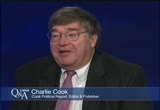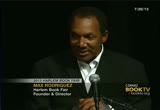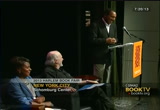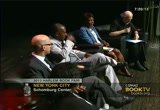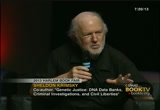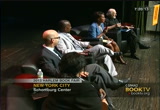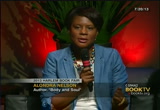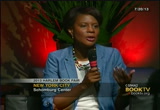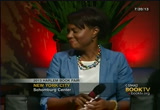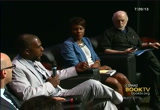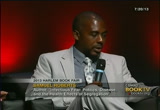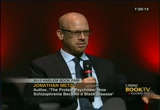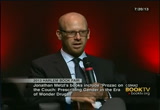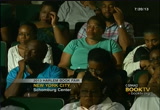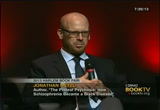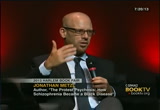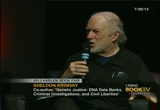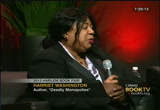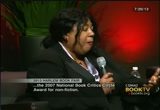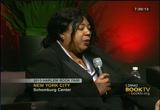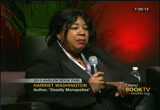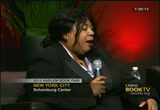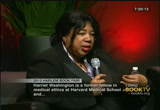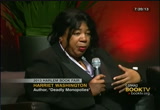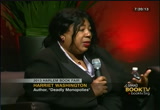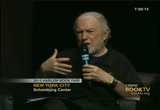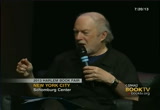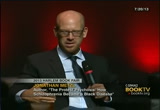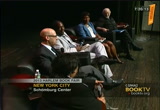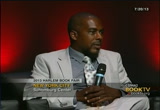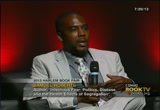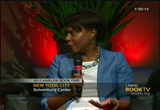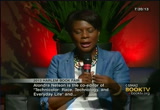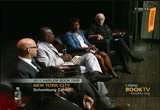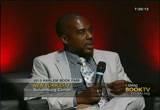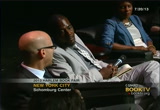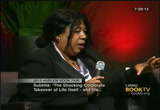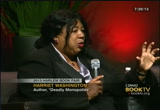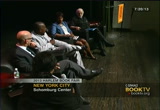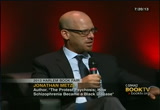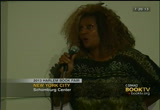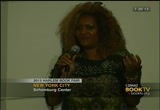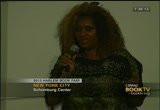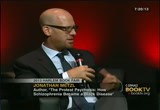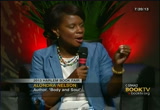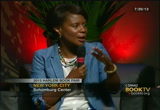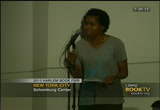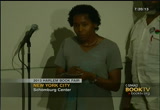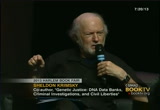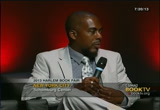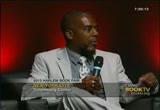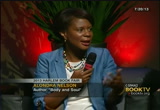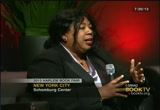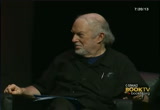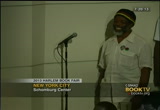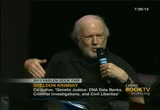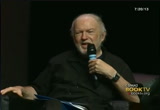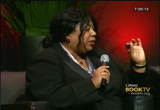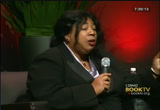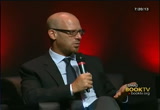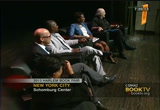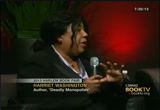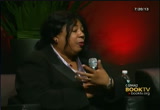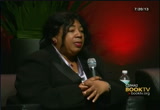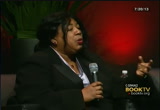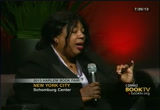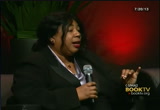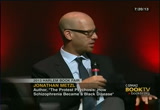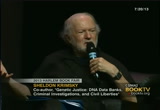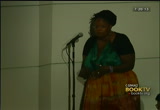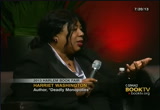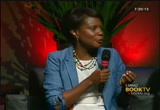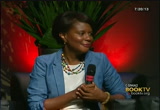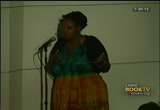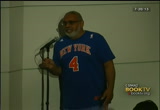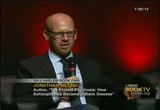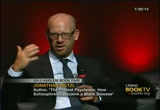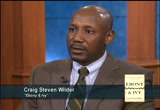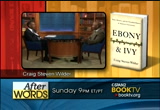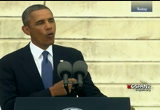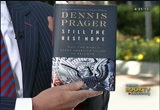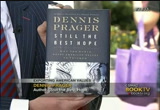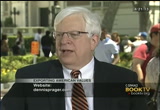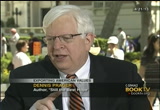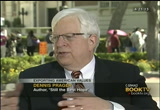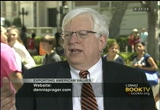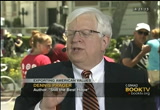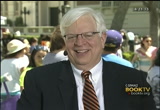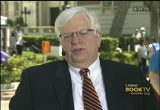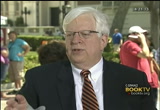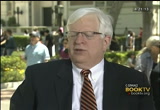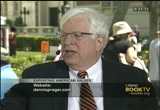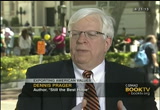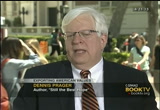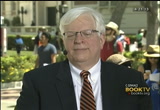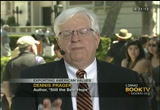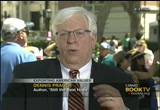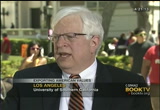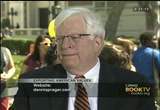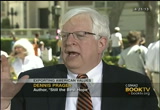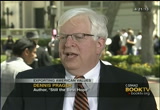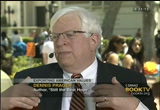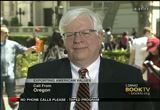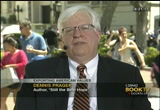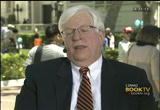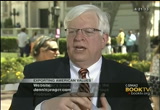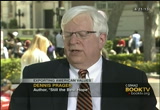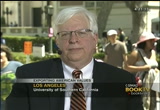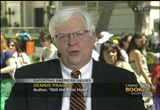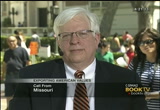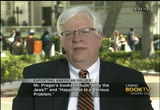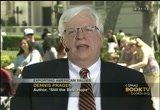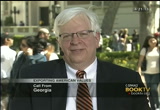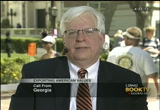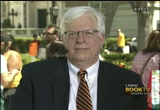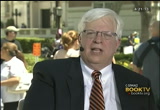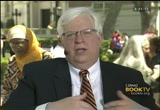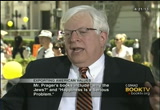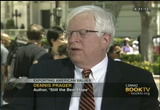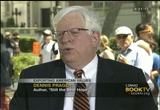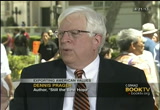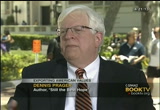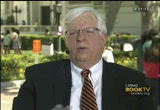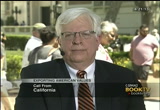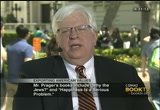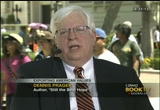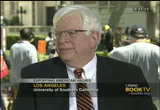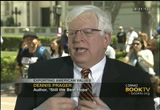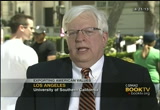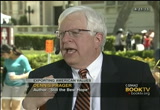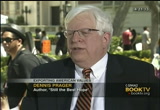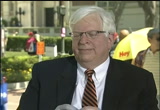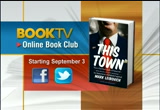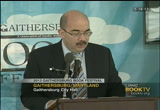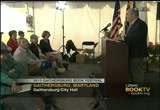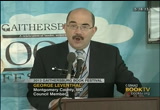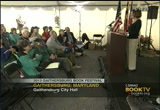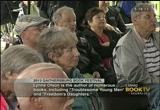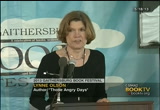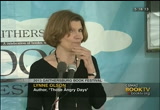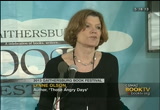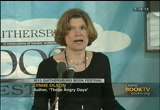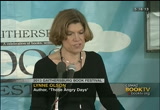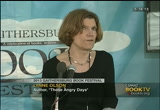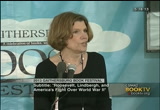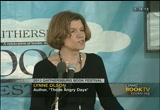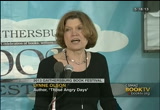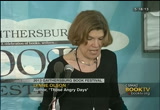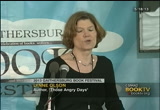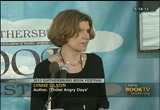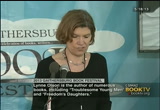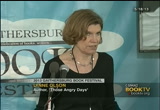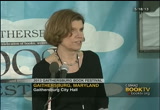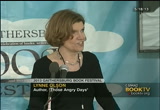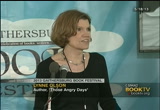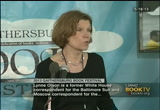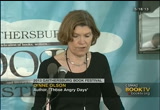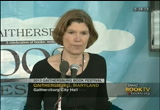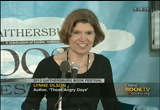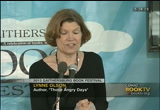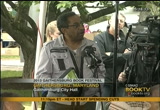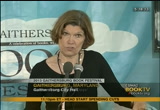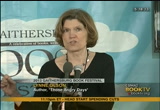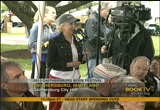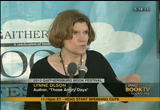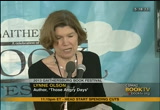tv Tonight From Washington CSPAN August 28, 2013 8:00pm-11:01pm EDT
8:00 pm
8:01 pm
saying, yes it's pretty bad. when you talk to caucuses on both sides and you get a glimpse of the inside players. now from the 15th annual harlem book fair a discussion of science and health. this is an hour and 15 minutes. >> so our first panel is titled mythologies of race, good science and health. before i introduce our moderator i also want to acknowledge rich who worked with me tirelessly in pulling these panelists together , discussing and coming
8:02 pm
up with the ideas of what are the conversations that we are going to present, what are the conversations that impact us as a community and we should discuss and see if we can find a way in or a way out. so again thank you so much, rich. our moderator for a first panel is earth's are sheldon krimsky. he is the author of genetic justice, dna databank in criminal investigations and civil liberties. he is a professor of humanities and social sciences. he is that tops university so you had me there. >> tops. >> oh that stuffs. you know how these academics write and visiting professor at workings college. please welcome professor sheldon krimsky.
8:03 pm
[applause] >> it's a real pleasure to be moderating this distinguished panel and my job is to simply put forth a question and conversation so we can get started very quickly. first of all let me introduce the panel members. to my right is alondra nelson who has written body and soul the black panther party in the fight against medical discrimination. [applause] to her right is samuel k. roberts who has written infectious fear politics disease and the health effects of segregation. [applause] to his right is jonathan metzl who has written the protests psychosis comes to how gets a frame yet became a black disease. [applause] and last but not least to his
8:04 pm
right harriet washington who is deadly monopolies the shocking corporate takeover of life itself and the consequences for your health and our medical future. please give her a welcome. [applause] i am going to start the conversation among us by first asking what mythologies did we all learn from writing our books that we would want to share with the audience today and discuss amongst ourselves? i am going to start with three myths that i learned from writing genetic justice which was really about forensic dna. you know when you watch all these crimes, programs on tv. dna rules it seems so these are the three myths that i learned.
8:05 pm
first of all myth number one that dna profiles are like fingerprints. not true. very different. myth number two is that dna evidence is infallible. also not true. it's not infallible for prosecutions and it's not infallible for exonerations. myth number three, collecting dna profiles is race-neutral. that is also a great myth. so let me turn now to alondra and maybe you can tell us what some of the myths were that you discovered in your work, body and soul. >> good afternoon everyone. good afternoon harlem. thank you for the introduction sheldon. i guess mine are three truths
8:06 pm
than three myths. i began my book body and soul with the sentence health is politics by other means which which means to suggest we are talking at the issues of health and science we can be talking about test tubes and laboratory benches and scientific research but we are also talking about contests over challenges to resources over health care access over access to scientific information, health education and the like so that his one true is some. the second is that the civil rights tradition, the black freedom tradition, that the tradition was always a health activist tradition and a health politics tradition so you can inc. back to marcus garvey's organization which had a cadre of nurses called the black cross nurses. we can think back to the powerful and brave fannie lou hamer who talked on the stoop about being sick and tired of being sick and tired and gave us a poignant euphemism mississippi
8:07 pm
appendectomy to give voice to the experience of poor black women in the south who were sterilized against their knowledge, an issue that has been in the news in the last couple of of weeks in hell of vonya and lastly i want to offer for you the black and the party was a health social movements. the black panther movement is a rorschach test for how we think about blacks politics in the last 20th century in particular but what we don't appreciate so much is that they were deeply engage and involved in issues of health activism health equality and access to medical care services in the united states. in particular as i discussed in my book they were engaged in getting people information to access to services that were under mentioned that we didn't know enough about, that the services were underutilized or not provided enough for such as sickle cell amenia -- a mania --
8:08 pm
sickle cell anemia. harry its prior look that many of you probably know medical apartheid the black panther party was engaged in protecting black minis from overexposure to the bad forces of medical experimentation so i write about one instance and their others and i hope other scholars will carry it forward but the black panther party participated in the 1970s in a struggle to stop the university of california from using, from introducing medical protocols and research that would have disproportionately affected black and brown men and boys in southern california. so they provided services and ways to respond to how black communities were underserved and also detected black communities from the way in which we were disproportionately over exposed to the worst harms of medical research. >> samuel, what about your findings? >> thank you very much. good afternoon everyone.
8:09 pm
similar to alondra i found some through this as well as some myths in my work. i focused as a historian on the late 19th to the 20th century which in a lot of ways is the era of jim crow but also the era of the birth of modern public health in united states and in doing so i found that for many black communities which were increasingly urbanized communities there was one particular disease that claimed the most lives. one cause of death which above most others claimed black lives and that was tuberculosis. this is a disease contrary to the myth of racial predisposition was actually one of living conditions in poverty so in many ways we find at the very birth of public health in the united states this mythology that while black table are dying of tuberculosis because they are racially predisposed when in fact this was a way of masking some of the often impoverished and just plain terrible
8:10 pm
conditions in which black people were forced to live. this was largely a product by the way of not incidentally residential exclusion from many jobs. the truth or that was the first truth and the first myth that i found is one of race neutrality of public health. the way you mentioned sheldon of the myth of dna and genetics or forensic genetics. we tend to think in the history of public health has it been this rational science that has emerged as a way of thinking of epidemiology and the birth of assumptions which works quite often against the people was supposed to serve. finally the second truth i found is much like alondra has mentioned in her study that there has always been a black health advocacy and the question is where do we look forward? for a? if you always think about the
8:11 pm
men, usually white men in white coats in hospitals as being the locus of health of knowledge production we may not lined out from the early 20 century there but in fact we find clubs ymca ywca, churches a sonic orders all being very much engaged in their community and environmental health in particular. thank you. >> jonathan what about your finding? >> thanks you so much. it's a true honor for me to be here today. i worked on race and mental health. i'm trained as a psychiatrist and i look at the historical trends about racial disparities and the diagnosis of different kinds of mental illness and the research that i did for the book and that i continue to do looks particularly at race-based misdiagnosis or over diagnosis of schizophrenia in black men three people might know this but starting in about the 1960s
8:12 pm
there were a series of research findings that found out of the blue that all of a sudden people discovered that this illness of schizophrenia was being overdiagnosed in black men at rates of anywhere from four, five, six, even seven times more than any other other group and to my surprise in researching the book i found actually this wasn't ice the case even though there is a long history of the relationship between race and sanity going back to slave times when we had diagnoses about slaves who ran away must be crazy and schizophrenia actually was a largely white diagnosis in the united states through the 1950s. all of a sudden in the 1960s kind of seemingly out of nowhere there was this disproportionate over diagnosis that has actually continued to the present day in which african-american men are dramatically more likely to be
8:13 pm
diagnosed. this is something that is actually at odds with genetic science and the way we think about the biology of mental illness. according to biology or genetics as we know it schizophrenia is an illness that shouldn't have any race or gender balance because it's something that should happen at the level supposedly beneath the levels according to biologists that should occur in 1% of the world population. regardless of who they are or where they live. my research looks at the question of why in the 1960s particularly did this start to happen and i also looked very specific weight at a hospital called the ionia state hospital for the criminally insane in michigan, where it was largely a white hospital through the 1960s and all of a sudden in the 60s and 70's increasing numbers not just of african-american men but actually african american men who participated in but our
8:14 pm
protests and then members of the nation of islam and other groups or had participated in some way in different riots. somehow they made their way to the hospital and they were diagnosed with mental illness. and so that is not a huge surprise when we think about the ways that politics and the diagnosis of mental, seth got together in this country but i would say the main myths that i looked and one that i have already suggested is that this increased rate of schizophrenia was somehow the result of something to do with biology or genetics and of course a lot of people argue that at the time. what i have found that is his almost entirely a social phenomenon that was linked to a series of changes and the two i will put forward. one was that people can't go there was a lot of anxiety about the political moment and people were linking political protests at the time to insanity in ways
8:15 pm
that started to make sense to people in the second was the diagnosis of schizophrenia changed in 1968 and the official diagnosis all of a sudden said anger or, hostility and projection which means blaming other people for your problems. in a way it made it very easy for doctors to see men who were protesting as mental illness because of these criteria so that myth number one is biology. myth number two is that this misdiagnosis happen because these doctors were is proportionately racist. what i found in doing a lot of interviews was that some of the doctors were pretty well-intentioned and some were not. and so really it was the structure that they were in, the structure of the diagnosis and in a way they were all using the diagnosis. it was a structural issue and the third myth is really how we deal with race-based
8:16 pm
misdiagnosis in psychiatry or mental health. our approach in my profession often is to make the clinician more sensitive to racial or ethnic issues and of course that's very important but what i show in my work is that actually racist assumptions are embedded in the structure of the health care systems did i argue that we need to teach the medical system to be what i call structurally competent rather than teaching doctors to be culturally conscious or cold truly sensitive trade. >> thanks you. harriet i just wanted to say a word before you get your chance and that is in our constitution the one right that is listed in its, not the bill of rights but in the constitution is the right to take out a patent. amazingly enough, but that was built-in by thomas jefferson and your book deadly monopolies questions some of that so tell
8:17 pm
us what you found. use your mic. >> i am very happy to be here and excellent question. i want to point out that thomas jefferson was not actually a fan of patents. he didn't like them very much. he didn't really want patents to be issued. he bowed to pressure by james madison and others and the patenting of entities that we typically don't think of as patentable especially things like parts of our bodies, especially things like medications that we need to live has always been hotly contested but people who had issues with it tended not to be people who were corporations who would profit from them. although there was always that tension, gradually through the laws this friendliness towards patents by people who were going
8:18 pm
to profit by them triumphed and now we have a medical system that use the patent as commonplace as something that is expected. i'm not sure if i addressed your question but i think there's a tension there and as we were discussing earlier in the green room we had some recent news and that the patents on breast cancer genes that were held have recently been struck down. i think that is a move in the right direction. the mythology though, the mythology -- there are too actually. first of all there's the myth that pharmaceutical companies like to promulgate as a rationale for doing things like patenting genes, patenting medications which they then charge you and me and outrageous on affordable price for. their rationale is we have invested a huge amount of money in time and interest in developing these medications
8:19 pm
that we have a right. in fact we have a need to charge you a lot of money to cover the cost. without our investment he wouldn't have medications for hiv disease. you wouldn't have medications for tuberculosis, for sickle cell anemia and all the things that threaten our health so you need to pay us this money so that we can continue providing them. that is a myth. the reality is it's not the corporations who are investing this money. if the federal government. where does the federal government get that money? from yukon pay your tax dollars. you are paying for these medications and in fact you are paying for them twice. you are paying for them to be developed in paying outrageous amounts of money to pharmaceutical companies who want to charge you thousands of dollars that you need to stay alive, stay sane or stay healthy. another myth i want to promulgate a something that i hear frequently. sometimes you hear about research being done in developing countries nigeria
8:20 pm
brazil cuba thailand and often there is a complaint that the ethics have not been adhered to properly. people are not being treated and are not being tested under informed consent. they don't really know exactly what is being done to them. they haven't been given information to agree. they have been given agents without their knowledge so informed consent and other abuses that surface and one thing that is a response from the company as well you have to understand we are testing these drugs for leprosy in brazil and perhaps we have cut a few ethical corners but there is a high rate of leprosy in brazil. they needs these drugs. that's a myth. there is a great need for these drugs in developing countries where they are testing drugs that these countries do not benefit. in fact michael kramer at harvard to to study in the found a 20 year span, i think a 24
8:21 pm
year span that of the 12,033 drugs invented by pharmaceutical companies only 14 were for use in developing and of this 14, five of the those trucks for animals and the people. in the end for drugs, could afford drugs of out of 1233 were advised for people and the developing world and yet one third of our clinical trials by pharmaceutical companies are not being conducted and the clinical world because it's cheaper. that's a very important myth so the rationale for these high prices and the rationale for bypassing people in the developing world and condemning them to poor health doesn't hold water. i want to backup for a minute and address another thing that i addressed in my book medical apartheid. one might say the entire book is addressing the myth and that is a myth that was used to change
8:22 pm
the law of that medical research. it's a very prevalent myth. african-americans tend to be underrepresented in medical research. if i say it's a myth people will produce data to show me that i'm wrong. the problem is many african-americans who have been used in medical research do not show up in the data. research has been done. it's been done without their knowledge. it's been done in the shadowy secret way and it's also not necessarily therapeutic. as i detailed in medical apartheid a great deal of nontherapeutic harmful stigmatizing research has been conducted in this country without being fully documented or fully acknowledged so that this myth that we are somehow underrepresented is only true if we are looking at therapeutic research and that is a conundrum. it's not really an easy concept to keep in mind that we do have to remember two things in my
8:23 pm
opinion and that is that we do need to be benefit from research in we have to do so with vigilance. we have to do so mindfully. we have to do so with all the protections which leads me to my final myth but i'm going to addressed to you today and that is the myth of informed consent. most of us rationally believe that should we choose to engage in medical research if you are recruited that we are guaranteed informed consent and by informed consent i don't mean simply the researcher asked her permission. that's part of it. informed consent also entails maintaining information about the study so you have to be told everything that you need to know to make an important decision. you have to give your consent but that consent is ongoing. when new information emerges and you find out for example that
8:24 pm
redhaired people don't fare well with drug testing. they have to tell you that so you have to get this constant information. the reality is informed consent is under assault in this country. it is diminishing very quickly in my opinion and again a very occult shadow leeway. it's not something that gets a lot of attention. the law was rewritten twice in 1990 and 1996. the federal code of regulations was rewritten to permit people in this country to beat entered into medical research without their consent. not only the law but also the medical culture has become more and more friendly to the idea of conducting research without asking peoples permission sometimes are without giving them the full benefit of informed consent. it's a myth we can afford complacency about that. you have to be vigilant about it and it's something i think we should be actively seeking to
8:25 pm
redress. we should be trying to eliminate these holes and informed consent because they are quite dangerous. in informed consent is more than offensive -- philosophical extraction. with african-americans with research vulnerability informed consent is a- >> does anybody on the panel want to raise a question for another panel member or any thoughts you have amongst yourselves? >> i just wanted to respond to harriet i saying i think one of the places to look for how black communities can think about how to respond of being at the participants in clinical research studies is to think back to the legacy of the black freedom struggle which is a think in some ways it feels like an uncomfortable or not a place that we would look typically but part of what is so important it if we can get beyond the demonization of the black panther party is the way that
8:26 pm
they were centrally and gauged in conversations about medical research. they were looking at protocols. they were going through protocols for a research center at ucla and interested in the ways in which they might disproportionately harm black communities. one of the responses i think to be more vigilant but a way to be more vigilant is actually to take agency and sit at the table and take agency and understand and find information about research studies taking place in your committee including those here in harlem taking place by uconn university. >> after i do a body of research there is something that i bring to my own personal life usually, just a higher understanding of how i am going to enter that what the world. did any of you come to some personal i don't know, cut up if
8:27 pm
any about how you were going to interact with the health care system, go with the medical system or with any of those or the scientific system from your research? i will give you one example and this is from research i have done in the past on conflicts of interest in the drug industry which is probably familiar to harriet. but if i go to a physician and this position is going to offer me a drug, i'm not going to take it right away. the first thing i'm going to say is, has this been approved for this use by the food and drug administration, by the fda? doctors have the power to give you a drug that is not proved for that use. they have that kind of power and if there is one thing i've learned from my research, it's
8:28 pm
how to talk to a doctor about the drugs that they are planning to give me. did any of you reach any insights about your own personal lives? >> i think i am in a unique decision and that i am practicing as a doctor and i have this funny life where half of my life i'm a practitioner and the other half of my life i am being a sociologist and cultural critic to basically tear apart everything that i stand for all the other days and saying it's imbued with all these problems. and it's funny because i have had some moments of overlap where i try to with eye on schizophrenia keep the two parts separate but there have been some moments where things for my research have come into the clinical practice and one was when i was doing my first book prozac on the couch. that was the book about the
8:29 pm
stereotypes of white women and drug ads. i probably spent two or three months writing this critique and there was this big prozac ad campaign. sue is playing with her kids again just like normal and there was a woman named sue who had a wedding ring and she was all happy playing with the is. this is a total stereotype. is that mean you have to be a white married women to be mentally healthier what's going on there exactly? a woman came into my office carrying this at incent hey.this is me. i am sue and i just want to be normal. at that moment i had two possible answers. one would have in the malpractice it shoot when i would have said maam what you are scented maam what u.s. suffered from is a socially constructed condition and what we need to do is change society rather than treat the individual or something like that you i think that would have been the wrong answer that instead what i realized was racial and gender
8:30 pm
stereotypes shaped her expectations about the drugs that i was maybe going to prescribe and maybe not. they also shaped the way that i would hear what she said. i think in retrospect the right answer at at that moment was not to say yes or no about prozac or some drug. it's instead to say what does normal mean to you? what are your expectations about this? how do you think is going to change her life and to think through my own lens of race and gender and culture and class to say that if you study culture it gives you better insight into the complex symbols of power that pharmaceuticals and the medical establishment become. >> i don't have a personal and know but what i found in my research thinking about the politics of health is the importance of us speaking with each other amongst ourselves in communities at dinner tables and
8:31 pm
wherever you may be about health and health politics. i say that because quite often we invest so much authority with medicine and if you read medical studies or if you look at medical journals there are these debates that to the lay public may be represented as being a consensus. in fact they disagree amongst each other. the sciences the jury still goes out on these things and quite often things that are represented to us are just plain wrong. it's really important that we talk to each other and we find information and think about health not just on the individual terms that medicine often will have us do which is to say in the case of mental health this may be an issue of your own problematic self adjustment or you could end up being misdiagnosed or the sense that oh there is genetically
8:32 pm
something flawed with you in by the way here is this nice little medicine i can give you for a hefty price to fix that. we need to think about how our personal health is a part of our communal health and our community life as well. those are things that quite often we don't discuss and particularly mental health. i would say that's one of the upcoming frontiers for black health. too many of our mentally ill are now part of the prison system and for reasons that ought to be thought of as public health. we have thousands of people suffering in prisons who ought to be getting clinical care. any other? >> i would just echo what sam said. part of what has changed for me has been an increased interest in community health clinics and the work that local communities are doing around health care and particularly interested in the
8:33 pm
work that organizations like the third group clinic or glenn flatbush clinic are doing that looks at acupuncture and holistic health care looking at the place of the health issue and bringing people in both four holistic medicine and also often for referrals to other forms of medicine. so i think caring forwarded to addition of public health is the social medicine tradition but very much what sam was saying about thinking about health not openly as an individual issue but issues about what we might call social health. to me healthy is to live in a healthy community and a society where you don't suffer microaggressions every day where you don't fear for your life going to a 7-eleven, where you can feel safe in your community and in your home and at your schools is all part of what it means to be truly healthy. i think community health community-based health
8:34 pm
organizations play a large role in making it a possibility. >> has the public health establishment incorporated violence in the public health framework clerics i can ask samuel that. is that now you know a part of public health? >> it is. they are our here in the united states where violence is a problem of public health. johns hopkins is starting to look at that as well. i don't think at this point it is yet part of the kind of mainstream public health. that is for a number of reasons. and a lot of ways we don't think of epidemiology of violence. i'm not saying that is the way we ought to err the way we have to. there are certain epidemiological things about violence that we should think about them ways in which social structures will aid and abet
8:35 pm
islands. those aren't the only things. if it sounds like i'm couching my answer it's quite frankly because i m.. there are ways in which public health can intervene and there are ways in which it can being is not appropriate. another frontier for public health that is particularly urgent and amending at this very moment is the problem of mass incarceration and prisons. there we have a problem which is a solution which causes more problems than it ever solves. many people who enter the system for petty crimes or quite often no crime at all will find themselves burdened with health, medical and public health issues that they have not had prior to entering the system. that rebounds to the community as well so for public health those are two of our more urgent issues.
8:36 pm
i also say that with the caveat that public health is not appropriate to everything. i am very aware that the guy with a hammer thinks everything is a nail and i don't think public health should think everything is a public health problem but we certainly have much to contribute. >> jonathan. >> sam is doing very good interview disciplinary work in addressing these questions of islands en masse incarceration are best served when we have strong coalitions between historians and the medical community and public health policy so it's fantastic kind of stuff you are doing. i am writing partially about race and guns and the questions of gun control. i would say this question of violence is unbelievably complicated. as a statement of fact it will surprise no one, try going out in the world and saying violence is a public-health issue and all of a sudden there are huge
8:37 pm
established industries and whole states that will come down on you for not doing that. look at the debate about meds for example. it's a very racialized conversation that even calling it a public health conversation put shoe at odds with many other types of public health. this question of violence is very complicated at the moment to understand. >> yes and i want to point out that in boston we have a very serious problem with adolescent violence. in 1993 there was a thriving public health epidemiology of violence initiative going on. a brilliant book about violence deadly consequences and also the work of built-in paroles who had worked owing on chicago in which he looks at the social dynamics and found interesting things. even things like the fact that in chicago there are no
8:38 pm
middle-class neighborhood. i found that fascinating. you can find white neighborhoods in middle-class but in chicago it tends to be either/or. there are all these things that may be worth examination but the thing that worked best in boston is one a bunch of -- a group of organizations including the harvard school of public health, including a group of ministers including social worker administration's and the schools form that mission and during the year the coalition was active there was not one fatality among adolescents in boston, cannot one. that kind of synergy that you mentioned is extremely important and it's also important to know that initiatives like harvard's happen and i don't know what happened to it. i left harvard not long after that. i wrote an article for the harvard public health review
8:39 pm
expecting great things and didn't hear anything more. the fact is that it has been seen as a public health initiative and my question though is a rate needs to be seen more widely that way. the other thing is that when we talk about violence i find it interesting we are only addressing half the issue. we are talking about violence among black people. white -- what about white on black violence. it was postulated that the racism such as what we encountered in the south by civil rights workers, that he thought that should be a mental health diagnosis. so how about the mindset of white people who kill black people? considering everything that's happened in the past week that is uppermost in my mind and also a very important part of the equation i think. >> i want to add that is part of my reservation as well about public health. we tend with the best of intentions and certainly as someone who is a member of public health and has a certain amount of investment in its
8:40 pm
mission, i don't want to set myself up as a public-health basher but those assumptions that harriet points out that we have to be careful of great quite often the media assumption we save violence and we talk about at the diehl -- epidemiology of black violence. very rarely except on the stage to say what is going on with this scary white aggression on black youth for example? i think i would have to be part of the question. certainly part of the answer. >> you seem to have some ideas about this. >> looking at gun violence for example conquered even the numbers bear out. the most done deaths and we have 19,000 suicides for example so in other words we racialized this conversation in a way that i think. and sam are exactly right that
8:41 pm
reinforces stereotypes and for me it takes us farther and farther away from the hope he can actually do anything about it. it just reinforces stereotypes. >> is there anyone in the audience who would like to ask the panelists, one of the panelists a question? don't be shy. anyone? yes, sir can we get a microphone or can you step up to the microphone? thank you. >> good afternoon. my question is more to piggyback on what she had mentioned in reference to, until we acknowledge racism and until we acknowledge the attack on the african-american male we won't be able to resolve it.
8:42 pm
when are we going to address it? anyone on the panel. >> anyone want to attack that one? >> i wish i knew. i agree with you certainly. >> the collaboration you mentioned in boston where the church the board of ed and everyone came together and mobilized, i think that's a start. my question initially was how do i go back to my communique in connecticut and implement something to make a difference to help our youth? i think now if nothing else i just got done teaching vacation bible school for teens from ninth grade to 12th grade and one thing the main theme was family reunion. with that family reunion we talked about what does a family reunion in compass? with that, we went out to you have fun and you see people you have not seen for a long time and you share stories of the past. one thing that i said to my
8:43 pm
students was that you know one of the words you say now a day is a problem. it's a problem. although i understand you are trying to change it and take the sting out of it but the reality reality is it's still there. so i asked them how many of you remember 9/11? most of them remembered and they remembered where they were. how many of you remember last saturday's verdicts and where were you? i said do you remember the stink lacks that is what the holocaust was for the african-americans. wherever we were at whether it be in america there was a sting. now that you understand you have more of a dialogue. realistically we stopped talking to our young people. hopefully it open to dialogue to take time and talk to her children. and listen to them and start by saying something like hello or giving a smile. i always say on a personal note
8:44 pm
it's an eye-opener and something we need to continue to try to embrace in our children and our community because it starts with us. thank you. >> thank you very much. >> i just want to say that that synergy i spoke of having all these organizations and these institutions all have to work together. i think that is key and perhaps your organization could be the one that starts the ball rolling and starts the communication but i think that does have to happen. >> as long as we can get some cards from you and you could give us some support that would be great. >> if i could add to that quickly also. one common thread through all of our work is we look to history and different kinds of history to find instances of structural oppression, the structural
8:45 pm
violence and racism and responses to its, exactly. and to see where the system seems incredibly slanted in a very violent way against black people. it turns out we don't even need to look to history now. it's shocking to me how open all this stuff about you now stand your ground and all this kind of stuff is there right now in the present moment. alondra you will want to add to that but how to deal with his as it's happening so blatantly. it's not even hidden right now it's the one of the ways what you are saying is to suggest that these ideas about violence particularly as it pertains to black men in black people are foundational to a american society. we certainly want to talk out saying hello and talk about the issues you're talking about in your specific community but i think it's always important to
8:46 pm
understand that it's not only about when individuals are doing. it certainly helps to say hi and it certainly helps to treat each other better but there's a longer trajectory of dehumanization in american society and society moreover that we see manifested in things like long periods of social isolation for people who are incarcerated conquer that we see in recent events this week. it's the longer problem and not only a problem for black people and not only of problem for black men but a problem of society writ large. to think about the little things we can do and they're certainly things we can do in our communities and their interpersonal relationships that can add to compassion and justice in society, but it's understanding that structural peace and working on both of those terrains at the same time. >> it's ultimately about the human race and we are all in this together but again whenever
8:47 pm
a president can be disrespected in front of everybody in called a liar and nothing is done about it starts at the top and it falls down. we need to acknowledge it as a problem in months we acknowledge it as a problem than we can start addressing it. thank you. >> thank you very much. >> i am very adjusted in continuing the conversation about the mythology of race and what happens and how it is that we as a community can interact better and have better conversations with our health care professionals. i was wondering if you all had some web sites that the public can go to if their family has been diagnosed with something? how do we have access to these clinical trial database is? if you could give us names of databases as samuel roberts was saying, that i have conversations with family and friends and they tell me family
8:48 pm
and friends have been diagnosed with things. where'd you go besides going to the internet? where can we access this information to do our own research and be more proactive in our own health care? >> that's an excellent question. there's a great deal of good reliable health information on the internet. the problem is there's a great deal of the other kind of information on the internet and the other question is how do you separate the wheat from the shaft? research things that you are told you have, it's critically important to talk to a physician as well. i know it's not easy. there a law did 15 minutes on average to talk with their insurers but you need a time to get the information.
8:49 pm
[inaudible] on the internet unless you have an m.d. or you are an expert. leave me a could be done i would be very happy to give everyone access to the web site that get the information and read it but please did not do that without discussing it with your m.d.. i recommend print it out and take it with you. this is what i found. tell me what's going on with me because otherwise you will never get accurate and complete information. if you don't trust your are enough to do that than you need a new doctor. >> biking give you one clinical trial. the government has a web site. so reputable old web site called www.clinicaltrials.gov and you can at least find a list of the ongoing started clinical trials
8:50 pm
in a particular disease category and then you can take that to your doctor and say are any of these relevant to me quite a those are a reputable of ongoing clinical trials that are required to be posted if they are to be approved by the food and drug administration. www.clinical trials.f. and then you put in a disease category and they will list 15 or 20 that are ongoing. then you can bring that to your physician. >> i also want to say there are number support groups depending on the condition you are talking about. the national association of -- mandy is the acronym. their web site is updated regularly and they deal not just with dealing with mental health issues but also public policy
8:51 pm
advocacy as well. also in terms of efficacy i also want to re-emphasize the importance of any kind of political mobilization. we often talk about the medical industrial complex as though it's a huge behemoth that squashes everything in its past past -- have an effect we are all historians here. you find out the power is kind of weak. at times if you mobilize in the right way and ask the right questions you can find where things for a round the edge and have an impact. so that being said grassroots organizations but also some of this can be good at -- not just grassroots but a few weeds that asked the same questions over and over again in the people that ask questions is important as well. >> i want to push back a little
8:52 pm
bit at dance theater is of the physician. you do want to talk to your doctor but i would suggest that people research reading groups in your community and information expertise is kind of diffuse. maybe you want to talk to a physician but it doesn't have to be your personal coronation. maybe there's a neighbor next-door that will read the journal of medical association with you and other people in your neighborhood. maybe there are physicians or nurses working in a community that you know. you probably know a nurse or two so start something like a book club in your local community around the issue you're interested. you can perhaps read the way in which the studies are in conflict and i think increasingly we have to be savvy sort of readers and consumers and patients so we can see and all of us bring different kinds of expertise. maybe there was someone in the group who can save -- there were only 40 people in this study that they're making these large claims about how drugs interact
8:53 pm
based on 40 people. yes we want to have these coalitions and i think that includes people with medical expertise because it's a particular kind of expertise but i think it doesn't be your clinician. grab that doctor at church or that physician assistant at church and get together and read a medical journal together. it sets up model for the younger party as well. >> if you have ever had to care for an elderly parent or someone with a specific condition you will find that hurston within two or three years about as -- knowledgeable as the doctors. >> if if i may i do want to add one thing. i think we have to distinguish between gaining health information is always a good thing to do. educating yourself about health which i agree with everything that has been said that the case that was mentioned as is a case where you yourself are facing a
8:54 pm
potential health crisis. in my opinion it's a different situation. in that case it's finally important to communicate with your clinician because only your clinician is responsible for your health. this is a person you have chosen to be responsible for you. you have to share all the information with him and you have to trust that person. this is the only person whose responsibility it is to look at you in particular and see where exactly you fall in that spectrum of illness and what should be done with you. you can't ask other people to do that. in many cases they will not be equipped to do that. >> good afternoon to the panel. this question goes to mr. roberts. i want to know what is the effect of these -- to the public
8:55 pm
health of the people and also the effect of the fta in authorizing certain toxic things in food? >> i have to say i am not a scholar of food and drug policy to the extent that the research i've been doing on drug addiction treatment is dealt with with fda policy. my understanding is there a sacred cheek of how the fta passes some of its cases that comes before it. in fact maybe two of our panelists have talked about fta policy in their work so i should probably just deferred to them. >> the fta. the food and drug administration is often touted to be the best in the world. other countries follow the rules of our fta very often and they
8:56 pm
are are really good people who work there. as a matter of fact especially under democratic administrations they tend to be much better. she was hired by the fda to be assistant to the director. she is a very good progress of individual. but the fta like any other federal agency has political pressures on them, political pressures and that is the problem. you can't always sort out what those political pressures are. they are often behind the scenes so some country might ban a chemical from exposure but our
8:57 pm
fda says no we don't have enough information yet to ban it. you know they are being pressured from an industry group saying if you ban this chemical than our prophets are going to go down. so it's a mixed bag. there's very good people that work there. they can't always decide things. it has to go up the chain of command and then eventually somebody says no, we can't and this or we can't restrict this and there are organizations out there that are constantly watching the fda, is suing the fda when they feel it's necessary and these public interest organizations help us. every once in a while they sue the fda and the courts say you are right. the fda hasn't done enough so that is the way our system seems to be, where you have good
8:58 pm
people working for the agency but not all of their decisions can be reached at the top levels. the fda makes mistakes. when they do they pull a drug off the market. sometimes those mistakes are because of information and sometimes it's because the drug companies don't reveal the information and then they get sued so there are all kinds of reasons why sometimes drugs get on the market when they shouldn't be or sometimes food additives get into our food and they shouldn't be. it's a good question. we have to be vigilant. >> it's very difficult to trust the fda. it has changed a great deal since the time when a protected americans from full thalidomide. the fda did not allow
8:59 pm
thalidomide to go on the market here and save countless sick children from being born. in europe where thalidomide was approved there were dramatic birth defects. that was a long time ago. today 40% of the money the fda receives to evaluate new drugs and new attitudes to foods comes from the manufactures of those articles themselves. that is an unacceptable conflict of interest in my opinion so i'm deeply concerned about the economic pressures on the fda. they seem to industry friendly in my opinion. they approve multiple drugs that over the objections of their own evaluate or is, doctors who work for the fda will refuse to approve the drug and find it it approved anyway goes on the market for a few years cause is a terrible toll and illness and death and then it's pulled from
9:00 pm
the market often not by the fda but the manufacturer itself. why? if the manufactumanufactu rer pulls it from from the market the manufacturer can playback on. the fda is a little too compromised and that is my opinion. >> i was actually going to make the same point. i was going to make the same point that the relationship to the history right now is something that people should be wary of because you know there is all this other nefarious practice ghostwriting research articles and squelching negative studies and bings that i was an expert witness testifying against the drug industry until i find out i was very conflict-averse so i was a bad witness. the stuff i saw going through the files was actually pretty terrifying about the relationship between the industry. it's another thing to be wary of it. i tend to tell patients of mine to trust drug's with longer
9:01 pm
9:02 pm
research in europe during clinical trials in terms of controls and research, people given a sugar pills and those were given the actual po. should the people given a sugar pills be informed that they have been given sugar pills? and secondly, in relation to content, should they be banned from the medical field? what kind of control would you recommend? >> it would be banned? >> the consent. >> the last question is easier. patton's should not be banned, but they should be much more strictly controlled. in fact, that is what most other countries to. they permit patents, but it cannot permit as many as we do they do not permit a 20-year patent life which a company can easily extend by abcaseventeen
9:03 pm
years by various manipulations. we have too many patents covering too many things, and we allow them to persist for too long spivvy the need to be tightly reined in and control. also a safety valve that we do not use enough. this safety valve is that if a country holds a patent on a medication but they're making a medication and to high price -- when i say a high price, and talking about $20,000 per year, or if they are not making the medication beholding the patents so that no one else can, then there is regulation that says the government can step in and say, you are not using this correctly. it will pay you of fee and give it to another company so they can make the drug and affordable credit to five -- this can be done. other countries to this. we are reluctant to do this for
9:04 pm
medications. we will do it for electronics and tv. in terms of informed consent and what you are referring to buy sugar pill, that is called a placebo. placebos to the studies, they should not always be done. a very serious illness. testing a medication for it. your testing what you think is a better medication. and another one already exists. you cannot give a person the placebo. why? that means you are giving a group of placebo. they're not getting any treatment. one group the standard of care they give the other group of medication a your testing the hope is better. that is what can be done. they can be used as frequently
9:05 pm
as they used to be used in the past you don't tell someone in the study for all the information you should tell them you don't share with them all the risk of the study. the serious problem, it's not that many people are affected so far. iran not talking about a small number of people. the study detested artificial blood only involves 720 people in the u.s. and canada. 720 people is not a lot, but at the end what did they find? and found that what they were testing caused more heart attacks and deaths than the regular standard care. so you have people dying in the study in never knew that there were part of medical research, never knew that there were in the study. and even worse, the very year that the study ended in the
9:06 pm
study was started. the research consortium study which involved 21,000 people in the u.s. and canada. 21,000 people and studies when no one tells them. what happens is there trauma victims, so ambulances go to attend to them, sometimes taken to hospitals instead of being given the standard of care they given experimental modalities law whole variety, including things that are patented. what my point this out? the patented is something that will make money if approved. if they're is a financial incentive. yes, these people, no one asked the permission. in many cases they're not even informed. you don't have to tell them there in the study. this is a very dangerous precedent for a country that has a long history of abusing people whom the through the use of studies that did not use
9:07 pm
informed consent. bad enough when people did it and could be called rose or renegade. now people doing it and a protected under the law. the rationale is that these are trauma victims. in a car accident, had a gunshot wound. trauma is a very broad category. the rationale is the need to do the research, but these people are not in shape to give consent that is not true. number one, no one has tested how many of these people are able to give consent. i found one, and i'm not even the researcher him. bomb the other problem is that there is an assumption that the research is more important in the person's rights. the fact is, some medical research you just can't do. this may be a case, if in on the tested on people conscious that we can't test the right-hand. you give an unconscious person something in a while and.
9:08 pm
perhaps you're turning your back commonality. very helpful. for a point -- i see it as a big problem. >> did you want to respond? >> i will say one thing very quickly. it is interesting because a lot of times when people call medical clinics or if they call the psychiatry clinic, there will talk to somebody about research before they even see a doctor something like that. the relationship between medical academic sessions and research. it is very close, almost -- some people a seeing researchers in a time of crisis before their even getting treatment. i think these issues can be increasingly important. it is still alive and academics are getting funding now. >> one of the things i have learned of the years, now to
9:09 pm
avoid drugs as much as you can. try every and the method you can think of, diet, whenever. [applause] there are times when you cannot avoid it. if you cannot avoid it, you can also ask questions. first of all, ask how long the strike is been on the market. it just came on the market, we have not tested it on enough people yet to know how safe it is, but there are always going to be side effects. almost every drug has side effects. if you are the lucky one you will get it, but try to avoid it. doctors in their good intentions will want to give you something, even if it is not necessary.
9:10 pm
you have to decide yourselves what is necessary, how low the one your cholesterol to be anyway. >> thank you very much. >> hello. my father recently died. he had creutzfeldt-jakob disease my question, i did not think it was here in america. that it not see any african-americans with the. delano it passed a lie. i'm wondering, is there any study, in a research in any information out there and how many african-americans are dying of this disease? we have been going to workshops teleconferences, and there are not that many african-americans there. and have not seen that many. have not seen much literature on
9:11 pm
it that pertains to african-americans. i just want to know, do you know a thing, books, research, anything of there? of one a different perspective than what had been getting and want to narrow it down. >> one thing and do want to say, i spoke with a researcher at yale. it's our opinion that many cases of dementia in this country are misdiagnosed. it seems as if it is really hard to get a handle on precisely how prevalent it is. really hard to get good data.
9:12 pm
>> the latest forms. the racial breakdown. i do think that there are other forms that have been studied more globally, and the mib data outside the united states. >> is it a myth that mad cow disease did not exist in the united states? >> i did not think it was here. where you series? when i started looking, okay. >> and has you a question? and sorry for loss. my condolences. would you looking for? >> he don't know anything. and then you find out when you
9:13 pm
do it, go on the website, it's all white people. okay. is it hitting black people? to black people catch it? this is -- you ask me to be honest. what i want to know is, with cancer you may be able. this is eight african-americans differently than caucasians? i just want to know how it's affecting us. because of so rare. you don't see that many. why do they have to get it? how did he get it? i want to know, is there information out there on how many black people actually catch it? any of the minorities get it? i just want to know. >> thank you.
9:14 pm
>> you know, without data it is hard to know. the fact that it is not very visible among black people, as you already suspect, that means nothing. it is frequently the case. you often see language very prevalent in this group of people. sometimes they find that it's more prevalent in african-american. the way to diagnose, my family, or a different. how many families of being misdiagnosed in them and in more african-americans actually do have it. african-american doctors talking about it? is it even of interest? is their research up there? so unlikely a problem. also the case that
9:15 pm
african-americans, particularly if they're poor and less likely have access to health care. >> it sounds like a family poured a lot of time and resources and to keeping your father with you. lots of people don't have access. that could be part of the reason why we don't have data by yields of the answers that would be intellectually and emotionally important. >> it think we have time for one more question. >> keep it simple and quick. i'm going to do so. you mentioned something about in the fifties, primarily for a white population. he is the time of the blue. popularize for african-americans. i'm wondering -- was not quite clear.
9:16 pm
weather was did genuinely ignorantly started to misdiagnose or they will like being down like a fox, the population that they can study, evaluate, and do different kinds of treatment on modalities. the last part of the question, is it coincidental that there were certain kinds of controversial their views like shock therapy and is there any connection? >> i would just say very quickly because i know we're short on time, part of the point -- it's a terrific question. and don't want people to leave here and think there's no hope for indians. when we spend a lot of time studying particularly issues about the medical system, on one hand that think -- and hopefully you heard this from this panel. they're is a very genuine need for people to get information.
9:17 pm
a lot of times their high these moments where the racial system, the bias and racism of the system becomes more apparent and others. what happens then is not so much that of a sudden there is this play given sandy. the way we define change in the way that has everything to do with politics. would argue is the reason people started seeing black man is crazy is because there were afraid of them, in the streets protesting. the language of insanity. quite literally incarcerating black man and having to take seriously the threat that there were posing to the white political order. in a way it was a very political -- and to give back to the ," it was being politicized.
9:18 pm
in support of what i think we're seeing, heat treatment, could help him and talked your doctors, but to be aware always of the politics of the health care system that can shape those kinds of disparities. >> well, we are at the end of this wonderful conversation. a very appreciate the audience participation. let's give hand to our panelists. [applause] [inaudible conversations] >> one of a thing of what the,3o
9:19 pm
recruit. >> to students bring this? >> if you think about this, what then happens is if you look at the name of the president and then three lines over, is taxable property is an enslaved person. what you will often have, the case of princeton or harvard, you will actually have the president's name did of the college. who owns the person. but common knowledge of the town , the president and the counter kind of inseparable. >> the connection between elite universities in the past intertwines the injury sunday night at 9:00, part of a three day holiday weekend. and book tv returns in september
9:20 pm
. two parties in the funeral plus plenty of valet parking. read the book and engage. >> thousands of people attended the 50th anniversary commemoration of the march on washington today at the lincoln memorial. the highlight, but c'mon with the king junior's i have a dream speech. you can see the commemoration in its entirety on line. here's some of what president obama said. >> the march on washington teaches us that we cannot win by the mistakes of history. ringmasters of our fate. and also teaches us that the promise of this nation moment because when we work together. we have to out reignite the embers of empathy, the coalition
9:21 pm
of conscience that found expression in this place 50 years ago. i believe the spirit is there, but force inside each of those. i see it when no white mother recognizes her own daughter in the face of poor black child. i see it when the black youth banks of his own grandfather and a dignified steps of an oven in one of. is there when the native born recognize that spirit, and the couples were discriminated against. when we turned not from asia or on asia other, but toward one
9:22 pm
another, we find that we did not walk alone. >> video roast joined us at the los angeles festival books, still the best told him one bill will be to american values triumph. this is an hour. >> host: to be joined our saidut by the best-selling author, dennis prager, as most recent book "still the best hope: why the world needs american values to triumph". is this about exporting american values? >> guest>>: that's the problem. th is about exporting. that's why the subtitle is about the world. we'rle need guidance to begin people. the basic differences betweeng left and right, left-wingtend ideologies tend to believe the airborne basically good.
9:23 pm
if you understand, and mydersta preoccupation is with understanding why there's so much even when world, so as a child that has preoccupied. it has been.ui p you need at diaz to get people's lives. ideol you need, if you will, ideology. there are three competing ideologies in the world today, islamism or islam. leftism and americanism.two those are competing ideas. and i define americanism very s simply some plastic. it occurred to me 25 years ago o and in my pockets and i commend the to the comments i had emptied and sure enough it wasto
9:24 pm
amazing. e the american value system on every corner. liberty in god we trust. that is applicable to all societies in the world, and ald commitment in. when i called the american val trinity, those three values is t the greatest value system of ths divine. defin how do you define leftism? p well, that's the thing.that t as a point out, thus the largest part of the book.r characteristics, and it begins, for example, with the belief that the greatest vehicle to get misses the state. state the state is a great vehicle tog goodness. ofu lie on the state as much as possible for the welfare of wh people. it begins with the belief thatsa economics explains human v behavior, not.vert the idea that poverty causes
9:25 pm
crime is a sort of dogma on thef left. to we who did not subscribe to live ,o some but to judeo-christianee values, think common-sense knowf that the basic cause of crime,oy certainly in our society, is aun malfunctioning conscience. people don't rate because oflent poverty. people are not killing becausept of poverty. they're killing because they --s we can say that.yo it's just unbelievable. you can say me know stinks'.peop people can see everything uld, but madd they sho bernie madoff, but you can't say that the average rapist and murdereraverage rapist and murds of that level. it's not really him. it's his parenting. it's poverty, and so on. so, the blaming of outside forces for human evil is a very deep part of leftism. the materialist view of life is part of secular leftism.
9:26 pm
in fact leftism is by and large opposed to a strong religiousity because marx said the obstacle to -- is religion. religion says try to be happy in the world that exists and leftey. says make utopia here. religion says utopia is in the next life. so those are part of the, whichics and they're all developed in the book. >> host: dennis prager is our gift. if you want to call him the numbers are on the screen. >> or go to our facebook page. you can post a comment on
9:27 pm
mr. prager's name. it's on the top of the page. no, mr. prager, in "till the best hope" in the chapter, why left succeeds, or part of the book why the left succeeds, favored groups are rarely to blame, you say, about certain issues. what do you mean? >> guest: well, if, for example, the most obvious being a racial minority. if they kill, it is because of racism and poverty. during the l.a. riots that took place in this very city. i was talk show host then as well. i said -- i'll never forget why i said it, a local nbc reporter said here i am at the corner of two streets where the riots were happening and i see a black gentleman throwing stones at drivers. and i thought, the man throwing stones is not a gentleman. the word i can't use on national
9:28 pm
television but the word that comes to mind is not gentleman. why did he say gentleman? he wouldn't say there's a white gentleman wearing a hood, burping a -- burning a cross. the left of center doesn't have the courage and doesn't have the ideology that permits it to blame evil on evil-doers. if the evil-doer is black, it's white's fault. if the evil doer is white, it's white's fault. and you name it. the palestinian israeli conflict is another example. don't blame the palestinians. what they're doing is understandable in light of how evil israel is. the -- by the way, that's a very significant example of the upside-down world of the left that israel is now increasingly the villain. in that conflict. in the history of the world, there has not been a war between a free society and an unfree society. never.
9:29 pm
it's either free and unfree or two unfree societies. this is the first time in world history that i know of that the free society is blamed for a conflict. that is thanks to the left. israel is the villain. not the palestinians, who -- half of whom vote for a genocidal ideology to prevail. the leftism is an upside-down moral world. i say this with sadness because a lot of people who subscribe it to are decent people, which, incidentally, is unique to us. we constantly understand there are good people with whom we differ. i have never heard a prominent leftist say conservatives are good people. people who believe that same-sex major is wrong and that we should continue to keep the male-female major. they're not doing this from hate. they have sincere beliefs in this regard. they can't say that. because if we're not demonized
9:30 pm
then the can't be fought. we're fought by demonized. that's what we are. and that is how they prevail. we're not basketballing ideas. we're battling bad people. we think they're wrong. they think we're bad. >> host: dennis prayinger in here you write about the left wing takeover of the universities, and you give, as an example, the university of california san diego. and you list some organizations that the university has, and -- >> guest: want to read it? >> host: i'm going to read it. >> guest: awesome. this is from heth very mcdonald at the manhattan -- >> the vice chancellor for descriersty, the chance're lazy diversity office. the associate chancellor for faculty equity. the say si stays vice childrenless for diversetive.
9:31 pm
faculty equity -- the staff diverse city lee anson, the undergraduate student relay own, the graduate student diversity lee asewn, the director of development for diversity initiatives, the office of academic diversity and equal opportunity. the committee on gender identity and sexual orientation issues. the committee on the status of women. the campus council on climate, culture, and conclusion, the lesbian gay buy sexual gay tax gender resource center and the women's center. a left-wing seminary, not a university. >> guest: that's right. >> host: should not these en. >> guest: they have nothing to do with teaching. it has to do with indoctrination and ideology. this is another tragedy. i was raised in the jewish tradition the teacher was honored bay pavement i'm serious. i was racessed a religious jew,
9:32 pm
i still am, to the not orthodox. i have written two book on judaism so i'm steeped in my religion. and we were taught to respect teachers exactly like parents. in fact the hebrew root for torah, teacher, and parent is the same. that how hoely -- holy the teaching role is in my extra collision. has sullied the word teacher. i never thought it would be possible. it's like the pure is word you have. what the teachers unions have done to teaching in the public schools and what the left has done to teaching in the universities, i do call them left wing seminary. the christian seminaries there to produce committed christians. the university there is to now produce committed leftists and they're succeeding. that's the biggest reason for election results and for the shift in american values.
9:33 pm
are you don't hear this ideas in an american campus. not here at usc and i'm not picking on usc. doesn't matter where we would be. there are fine teachers at every university, no question, but overwhelmingly it as an indoctrination. bill maher, man of the left, just had a guy from uc san bernardino. who -- said to him, i'm courteous, in light of the latest terror attacks. i'm just curious, if there had been a show mocking islam on broadway like there is mocking mormonism, do you think first that anybody would have put it on some do you think there would have been violin result and the professor says, no, no, would have been the same. muslims are perfect live okay with that -- perfectly okay with that. you're taught lies on a campus. yale university is so scared of islamists that they refused at
9:34 pm
the last moment in their own book on the mohammad cartoons in denmark to publish the cartops in a book on the cartoons they would not publish cartoons. on a book on nazi anti-september tim would they have preduesed naziisms about the ju jews in of course. no christian is killing anybody for antichristianity. there's a christ thing that went from museum to museum of the crucifix in the quote-unquote artist's urine. can you imagine a picture of muhammad in urine what would happen haven't? but yet we're taught there's no bigger threat from the world of islam than there is from the world of christianity. that's taught at here and virtually every university in america. >> dennis prager, where can people hear your radio show. >> guest: at it national. go to dep nit prager.com and i have something that i am trying
9:35 pm
to undo the dam of the university, called prager university.com. we got the finest thinkers in the world in very sophisticated -- just five minutes, all i ask people for is five minutes, prager university.com. i'm trying to do with whatever god gives me more to and with thend energy i have, to undo the damage that is being done by leftism, and the sad part is -- i know this because my extended family is mostly liberal, and i love them. i attacking my dear extend family and not my immediate family. thank god my boys are conservative. but i love them. and i know they're good: and -- but i believe they've been misled because all you study from elementary school to graduate school is from the left. it is a brain wash. if all you studied was
9:36 pm
evangelical christianity, from childhood to graduate school, wouldn't the liberals say you were brainwashed? why isn't it true if you just get secular leftism from elementary school through graduate school. do you know that here in cast textbooks are enough by will you -- must include the contributions of the transgendered? by law. you will have to have pages on transgendered contributions. people who were crossed over sex, or dressed in the other sex. clothing. isn't that absurd? isn't that totalitarian? i thought the purpose of the textbook was to tell the truth, not make groups feel good. but as i point out in the book, leftism is overwhelmingly rooted in feelings. >> host: dennis prager is the author. "still the best hope" is the name of his recent best seller.
9:37 pm
louis from florida, you're on the air. you're talking with dennis prager. >> caller: i'd like to ask mr. prayinger and his ilk what he just said about truth, why should people believe the bible when that's the biggest novel ever written? who believes the earth is 5,000 years old? how can you follow a book that tells you the world is 5,000 years old and hisclass commentary about the christian schools and the seminary, how does he say something like that and he wants to be honest? i know this man is a right winger, and he wouldn't fifth credit to anybody, but my main question is, why is he so hung up on religion when religion is just a false pretense? answer me -- >> host: all right, louis, we got the response. let get a response. >> guest: okay. first of all, i don't know
9:38 pm
anybody and i am rather deeply involved in the christian and jewish world who believe the world is 5,000 years old. there are some people who do. i don't give a hoot. i think the universe is 13.7 billion years old. whatever science tells me, and proves, i believe. so it's a nonissue to me. don't read the bible for geology. i read the bible for moral guidance. so did every founder of this country, including jefferson. jefferson removed the miracles but jefferson wanted -- you know what jefferson wanted the seal of the united states to be? you can look it up on the internet. jefferson some franklin called deities, the seal of the united states was to be the jews leaving egypt. that how steeped in the bible jefferson was, not to mention adams and washington and so on. that's where we got the idea that we get our rights from a creator that comes from that
9:39 pm
book. doesn't come from dna. doesn't come from darwin. values don't come from secularism. secularism doesn't have a value system. secularism is the absence of religion but the judeo^- christian value system gave us our values. if god doesn't say do not murder, murder is not wrong. this drives people crazy and i have debated this at oxford and elsewhere, and the leading athiest philosophers all agree if there is no god the wrongness of murder is soley a matter of personal opinion. i like yellow, you like blue, i like murder, you don't like murder. only there there is a god who says do not murder is wrong. so i'm very fearful for the united states dropping the bible in favor of, you now what? feels. because i don't trust the human heart very much. >> in t section of your book,
9:40 pm
the moral record of islam, allah alone runs the world, reason some nature have no say, you write, and that is probably the primary reason why, after a certain date, science ceased to most likely could not develop in the muslim world. >> guest: i back that up. we talked about leftism the whole time but the book, after all is bat islamity. there's islam and then there's islamism. islamism is the believe that sharia should govern the society. that's what i'm worried about. i'm not worried about the moderate muse him. it's no nonissue to me and the secular muse limit i'm worried the muse him going society. there was a terrible battle, and i back this up. 400-footnotes in the book. a terrible battle during the
9:41 pm
early middle ages within islam. do things happen because they happen or solely because god/allah wills it? and theliale -- the allah wills it team, as it were, prevailed. so the example given, if an arrow hits its target it's not because of wind velocity of the ability of the archer it's solely because allah willed it and so reason some obviously science ultimately became rather rare in a major part of the islamic world. >> host: dennis prager, miguel, posts on four facebook pain for you, the left is for the state to play a fair arbiter and equalized role, once achieved the state fades away in prager's view, however, corporate, religion, and social darwinism should be the rule that opresses
9:42 pm
the masses and benefits the few. >> guest: okay. the state fading away, if my -- i stud yesterday marxism at the school of international affairs so i'm very familiar with that. everything marx predicted did nod come through. this is one of them. the state doesn't fade away. it always gets bigger. i don't know writ is getting smaller on earth or ever got smaller. it gets smaller only if conservatives prevail, margaret thatcher or the late grate ronald reagan. if willfully it is made small. that is by the way the american ideal, this person obviously, god bless them, doesn't agree with the american ideal of small government about i have a motto, and it is a truism. the bigger the government, the smaller the citizen. as the go gets bigger, you and i get smaller. as the government gets smaller, we get bigger. we take care of our neighbor.
9:43 pm
we take care of ourselves. we take care of our families. instead, as in europe, the government is everything. the biggest concern of most europeans is, can i work fewer hours and how many trips can i take because now it's a human right in europe to travel? we have had -- why did we have -- why do americans give so much more charity than europeans? why? are we born better? of course not. we give far more charity than europeans because the european has been taught, you don't have to take care of anyone. the state will do it. and why? why are lefties proud of that? what is beautiful about that? i conclude a mars cyst because the state will take care of my neighbor. cohad a huge demonstration on behalf of legal marijuana. wow. if my child had gone to a, let's celebrate legalized marijuana i
9:44 pm
would have believed i failed as a parent utterly. the mass simple involved here, that is what preoccupies you. you're now a free to get high on marijuana. just think about what animates a lot of people? it's just painful, frankly. so, this -- and social darwinism? is this what the left uses to attack the belief -- i don't even know what belief they're attacking. what about social darwinism? that the talented and the harder working get ahead? why is that darwinism? why didn't that merit? i have in there from -- i believe it's a harvard economist, a princeton economist actually. man won a nobel peace nobel pri. and he shows how much more television poorer people watch than richer people, because richer people don't have the time to watch tv.
9:45 pm
they work so hard to get ahead. this doesn't mean that poor people don't work hard but on average, in america, by and large, there is a correlation between hours worked and income. by and large, of course there are exceptions at both ended. >> host: booktv is on the campus of the university of southern california "the los angeles times" festival of book, and matthew in portland, oregon, you're on with dennis prager. >> caller: good morning, mr. prager, pleasure to talk with you. >> guest: thank you. >> yeah. trying tomorrow my original question because you said so much. i appreciate you comments. you mentioned a comment earlier in the interview about how the left sees making you-topia on earth and religion is more about utopia in the afterlife. i would say that u.s. history,
9:46 pm
especially revolutionary history, is that the founding of the country and the special values we have are all men created equal, and all those special things that are new to the world, not necessarily making utopia, but all those -- wasn't just sitting back and accepting what was. it was trying to make it better. how do you respond? >> guest: that's good. thank you very much. of course -- look, my whole point of the writing of the book is that we have the best system for making a better society. a better society is not utopia. the president of the united states, five days before he was elected, said to a very large crowd in five days -- the fir election -- in five days we'll fundamentally transform the united states of america. i don't want to fundamentally transform america. utopians want to fundamentally
9:47 pm
transform america. i want to improve america. not fundamentally transform it. that's the utopian streak at the hart of leftism. we can make a world where there is no suffering, no evil. of course it's a beautiful goal, but to have it as a reality? everyone who has tried to make a you utopia, my viewer, everyone, everyone who has tried to make utopia on earth has made hell on earth. those who want to incrementally improve it make a much better place. >> host: from our twitter page, carol romano asks: mr. prager, why are liberals so vested in box -- boston bombers being home-grown white terrorists. >> guest: there was an article on a liberal web site, where the author, a man i debathed once -- debated once, said he hopes it is a white american, home-grown
9:48 pm
american. can you imagine had somebody written an article, i hope it's a black? or i hoch it's -- i hope it's a middle middle easterner? can you imagine the tsunami of con tell he would have received? look, that man and others don't want to recognize that there really is a moral problem within islam today. that to say that means you're a hater. we can't say truths. if you're against affirmative action, you're a racist. if you are -- if you think the human fetus has any rights more than a dog or as much as a dog, you're a sexist. if you think summary judgment be defined as a man and a woman, then you're a homophob. there's a one-word label for all of us that is thrown out.
9:49 pm
so if i say, yes there is a bigger moral problem in the world today in the world of islam, an the clippity or buddhism or hinduism, then you're an islamophobe. so, therefore no debate is necessary. and that its the reason they do it, because, as i have found and had on my radio show the greatest, most of the biggest leftist names, except "new york times" columnists. they don't go on shows. tom freedman will go on npr but not on any of the conservative talk show hosted. i don't blame him, even though we will treat him perfectly decency and i'm known for treating folks i disagree with decently. that's why they come on. i just had on the great university of chicago professor, one of the leading names on the left, and he was delighted to be on and we don't agree on anything. but my motto on my show is, i prefer clarity to agreement.
9:50 pm
so, if i clarify where i differ with the left or whomever, good. back to this. to merely say that there is more of a moral problem today in the islamic world than in the christian or jewish or buddhist or hindu is to be called names. people are afraid of being called names. i'm not. and it shuts up a lot of people. >> host: kathy in west mont, illinois, go ahead with your question or comment. >> caller: mr. prager, i have a question. one of my questions for you is, can you name any society that you're aware of that doesn't suffer from deep levels of poverty that is not crime-ridden? >> host: kathy, can you very quickly explain what you anymore. >> guest: can i name a society that is crime ridden that does not suffer from deep poverty. the point being that there is only crime where there is
9:51 pm
poverty, is that -- first of all, every society has poverty. and i would turn the question around. were the impoverished ancestors of virtually every living american criminals? my grandparents had less money in absolute and relative terms than the average poor person today. the thought that my grandparents would have committed a crime is laughable because they were religious jews who had a value system that never said, if you're poor, you can rape. so it's unbelievable to me to ascribe evil to poverty. >> host: dennis prager, elizabeth posts on facebook, on a personal level, what has been the hardest challenge in your life and how did you get through it? >> guest: the hardest challenge on a permanent level?
9:52 pm
or an idealal. >> host: personal. >> guest: divorce after 17 years was a terribly painful thing. terribly. and you build hopes, you have dreams, and they -- and you have a child, and it's all very painful. i am very open on my radio show, as i am here. people know about my life. i don't think there is a closer second to that. i had eave dream of a picket fence, not necessarily dogs but -- my wife wanted dogs. i'm currently married to the love of my life, and she loves dogs. i like dogs for the record. don't love them. >> host: next call for dennis prager comes from dennis in st. louis, missouri. >> guest: i bet you dennis is over 50. are you over 50?
9:53 pm
>> caller: i sure am. over 070. >> guest: there are no young denniss. >> host: go ahead. >> caller: i'm also jewish, and i've been interested in our york for along time. not bass i afree with you but because i enjoy disagreeing with you. quickly, and make you have already answered this, from a jewish perspective, how do you explain why so many jews seem to support a much larger role for the state than you die and even why so many jews are more critical of israel than you are? which by criticism i don't me support -- mean supporting the palestinian cause. and then a comment -- also a retired teacher and i thought you inflated the power of teach -- not the power of teacher unions over bread and butter issues about i thought you inflated the influence of teacher unions over what is actually taught too -- to
9:54 pm
students. >> guest: not. by state law. >> host: dennis? very quickly, we'll get mr. prayinger to respond do you listen to his radio program? do -- >> caller: i read a few of the books and articles, and occasionally have gone on c-span to pick up other programs. i use your web site a lot to listen to interviews. so -- >> host: , thank you, sir. >> guest: all right. well -- >> thinks for call. >> guest: why are jews on the left is a very complex question, and i could devote the hour it to but i won't. so here in a nutshell. when jews left judaism, they stayed religious but the religion tray affirmed tenned to be any form of leftism rather than judaism. this it not a condemnation or insult. it's a description. jews have been taught by judaism to make a better world. that is the message of the prophets.
9:55 pm
and if they warrant going -- weren't going to do it through -- teach the world god is the source of ethics and demands ethical behavior -- they did it through secular ideas. they rejected religiousity and accepted a new religiousity which is secular. many people describe marxism as secular. here's an interesting statistic and at it in my book. didn't come up with this, a professor at brandeis university did. the most procommunist press in the 1930s, outside of the soviet union or inside the united states was the yiddish press. jews took a new religion as as substitute for judaism and that was, you name it, feminism, environmentalism, marxism, socialism, and for some even communism. but jews love-isms.
9:56 pm
they create new moms and every one will make this great world and in state of using the -- their religion that came with being jewish, and it's a very sad development to me. >> host: still the best hope. nancy is in georgia. go ahead with your question or comment. >> caller: hi everybody. hello, mr. prager. this is the first time unfortunately i have ever heard your name, although you're very interesting. >> guest: where do you live? >> caller: i live in south of atlanta in georgia. >> guest: i'm on atlanta every day for three years. >> i'll have to listen. i'm a wherein christian, aim neither left nor right. i think that both arecast casting stones and they're corporate owned.
9:57 pm
jesus said we're all one and within that i'm often troubled by the talking headed of bowling sides -- i don't mean that as a percentage you'retive -- where they don't do anything to reach out one to the other. i found our biggest problem is reaching across laterally, and it seems that the talking folks on both sides tend to help -- >> guest: what do you mean by reaching out? does it mean agreeing with the other? dialoguing? on my she, have the leading spokesman whenever possible from the left. is that reaching out? if so, i'm innocent of your charge. >> host: go ahead. >> caller: actually wasn't a charge. at it simply an observation, and i have never heard you and i will seek you out. >> guest: that's right. i'm not -- i'm an example . >> have heard other folks.
9:58 pm
what i find is a lot of talk that separates us and i'm talking about the everyday people, which is what i am. i find that rather than when we talk laterally, what i hear or a lot of talking points from both sides instead of, i am 69 and i have been around jesus for along time and i really believe he didn't stutter, and i never hear his words put out in terms of reaching -- coming together and trying to resolve our differences. because we are diverse. it's in our differences that are constantly reinforced that create the problem. the other question i have for you if i may is, i consider myself a clip of there are christian of neither party but many on the right would call me more to the left because we're all one. and i'm wondering why the christian left is often ignored and are they not viable? and my final question is, do you really believe, because i lived in ireland marx i father was
9:59 pm
irish, rest his soul. do you really believe the rest of the world do not have comparable value inside i wish you blessings. thank you very much. >> guest: i wish you blessings, too that's correct. don't think the rest of the world has comparable values. that exactly right. if i thought so, not only would i have not written the book, i would have abandoned the belief that there is better and worse in the universe. you believe jesus has better values. who doesn't believe that what they believe in has a better value system? if my value system isn't better than every other -- then i will adopt the one that is better. i have one life to live on this earth and i want to live it with the beth values i can find. if it's not the american value system i'll take leftist or islamic put this system of in god we trust has deviced the most egalitarian society in that
10:00 pm
there's -- in that there's such fluidity between the classes or among theocracies and it has given more people more prosperity, given more people more liberty, more opportunity, than any society in the hoyt of the world. you judge an ideaolly it fruit. i like the american fruit. it's given people blessings. it gave two brothers blessings kuo who decided to then murder the people who blessed them. a little sick. but, yes, of course i believe ours is a better value system. just as you believe jesus is a better value system. and by the way northern who believed in jesus founded this country. but they understood that the -- that it wasn't jesus alone that was necessary. that you needed small government and that you needed from many, one, which is the statement that race and nationality don't matter. >> host: dennis prager, nancy also talked about lateral reaching out. a lot of talk in washington -- >> guest: well, the reaching
10:01 pm
out, there were two separate -- the reaching out between republicans and democrats. look, that is a tactical question. on the larger question of the society, what is reaching out mean? we conservative talk show hosts have leftists on routinely. not just myself mitchell -- myself. my colleagues have leftists on regularly. they never have us on. never. msnbc is virtually devoid of any of the ideas you just heard. npr is virtually devoid. pbs is virtually tee void of -- devoid of it. not to mention the universities. we, are very happy to debate. i have offered -- i would love to see a debate between paul cordman and the head of the cato institute, for example.
10:02 pm
i think we should try to raise $100,000 for cancer research, paul klugman debate an economist, or two or throw on each side. but they don't debate. they call us names. of you believe marriage should be between a man and am woman you are called a hater. who wants to debate haters? i wouldn't debate the klu klux klan. that's how the left feels. i you're not on the left you're a hater. you are sexist intoll rant, racist and big gotted. howard dean, candidate for u.s. president, said that republicans that go to bed at night not caring about the welfare of children. this is typical of how we are perceived. and that's what sustains leftism. because right -- the right must
10:03 pm
be so awful i better be on the left because i have good heart. >> host: where do you grow up in. >> caller: brooklyn new york. my father, who is still with us, is 94, and will be on my radio show on his birthday as he has been every day for years. was until very recently a certified public account. i'm one of his clients and he is very, very good and his rate was great. i must say that, too. aside from everything else. my mother, during her heyday, she ran a 300 bed nursing home. and she passed away three years ago. >> were they consecutive? >> guest: that's a very interesting question, were they conservative. i was raised -- brooklyn jew, columbia university, give me a break. you're going to be a democrat. it comes in your birth certificate. the first republican i ever
10:04 pm
voted for was reagan and i voted for jimmy carter first term. what in values i think ultimately the values i got at home were conservative. but the -- but we were democrats. that was a given. but what got me -- this is what got me. because fighting evil is the single biggest passion of my life, and i knew that communism was as genocidal0s naziism, i didn't understand how the left could condemn anticommunism. and they did. they didn't defend communism -- some did but most didn't. but they did cop dem anticommunist. that what turned me away. if you can't say that communism is the greatest evil of our post-nazi era, then you're moral compass is broken, and indeed
10:05 pm
the leftist moral compass is broken. >> host: your parents make a cameo in "still the best hope" when you're talking about the section, why the left succeeds, talking about second hand smoke. >> guest: you really read it carefully empathetic -- hit historia is a left wing myth ol'. there was no epidemic of heterosexual aids in america. the number of girls dying of anorexia was exaggerated by feminists by a number of a thousand. the number of homeless in the america was ay number. mick snider who made it up admitted it on abc tv and then committed suicide. the number of hysterias and second hand smoke is an example.
10:06 pm
>> next call for den anything -- dennis prager from bob in california. >> caller: how you doing. where to start here. it's hard for me to know where to pick up on any of your statements. for instance, your generalizations are rather all-come patting. the statement the jews accommodated communist as a new religion -- >> guest: i said leftism, and -- i said leftism and i said the yiddish press was the most pro communist press in america in the 1930s. i'm very careful with me language. most jews were not communist or pro communist, and i never said they were. >> host: go ahead, bob. >> caller: what was a different statement. those are two separate statements you made at different times. you said definitely said that
10:07 pm
jews. thought communism as the new religion. >> guest: sir, sir, i'm sorry. i don't know what the routine is here. i let people who differ with me have all the time they want on my show and this is not my show but you cannot say what is not true and then pass over it. i said, when jews abandoned judaism, they've stayed religious in their desire to make a better world, and picked a whole owes of other ismss, and i said, a few communism. that is what i said, sir. aviate all on tape. >> host: go ahead, finish your statement. >> caller: well, i was going to say there is no question about the fact he said that talking about communist, and instead of saying some jews, it was jews. the statement that you made about the reporters saying, gentleman threw some stones and
10:08 pm
he was no gentleman. you know, that's really pretty much nitpicking. i was a journalist in chicago, and back in the '50s when we covered a lot of race riots, when blacks were moving into neighborhoods and the people who were rioting were not -- were mostly the people i talked to were right-wingers. so, most of these statements that jew make are -- that you make are so general in their makeup. i was -- >> host: all right, bob, let's get a response. dennis prager. >> guest: okay. there's nothing to respond to. he didn't say anything i said was wrong. thank you for calling. >> host: joe, posts on facebook, how problematic is the modern culture that revels in sib simple, profanity and consumerism to the project of american renewal? >> guest: there is consumerism,
10:09 pm
cynicism, and what was the do. >> host: profanity. >> guest: they all have different origins. don't have this belief that consumerism is this great evil that people say. every year i defend people who buy a christmas gift, for example. i think that it's one of the most beautiful traditions in america that people spend time thinking about what will make a relative or friend happy on christmas. itch people think that's a disgusting part of the culture we have a different value system. is christmas made too consumerist? i just ask people who say that -- every good thing can be taken to an extreme. so, of course, you could have too much vitamin c. you can have too much water. but in general, i think that it's a credit to christianity that there is a holiday where millions of people, where the bulk of osite, things about buying people things that will
10:10 pm
bring them joy. so i don't buy the consumerist problem. the consumerism keeps people consumerism keeps people employed. it enables people to have a job. to bring food to their family. cynicism, i think we are raising a jaded -- i would use jaded more than cynical -- i think there's a lot of jadedness among you can people because they're sexualized so early. this is a real tragedy and it's a discussion for a whole other time. why that is happening. kids who have early section toned be jaded and that is a problem. and the third was, again, simple cynicism -- >> pro fan it in. >> guest: i have a chapter on profanity. with the death of the judeo^- christian value system, the concept of the holy and the division between holy and profane is obliterated and so a lot of folks on the secular left
10:11 pm
curse publicly, and i actually document it. where cursing -- now, everybody -- most people, including myself, will use a curse word in private. i don't do it a lot but i do it. but public, that's a different thing. it's like public nudity. san francisco had a 7-6 vote outlawing public nudity but a lot of san franciscans don't see anything wrong with it. secularism has effect. the notion that we're created in god's inning and shouldn't have our genitals exposed like an animal is a religious idea. with the death of religion nobody sees wrong with people walking around naked. >> host: your book has been sitting on the table and a lot of crowd here. people have been walking by saying, is dennis prager going to be on? yes, good. is dennis prager going to be on? yes. real 50-50 here.
10:12 pm
everybody has an opinion. >> guest: at the l.a. book fair at usc, if it's 50-50, i'm doing very well, i must say. so i'm very happy to hear it. look, i care about everything or nearly everything that folks on the left say they care about. compassion, goodness, concern for others, but i think leftism hurts those causes. so, i'm a bigger problem to them than the guy who just shouts at them. and i come from within that world. i understand it. and i think that it's intellectually and morally unsound, and because i'm not a yeller or screamer or hater or any of that, that's why people on the left who do come on feel so comfortable coming on. i just gave you one example
10:13 pm
recently. howard zen, the biggest of all the leftist historians came on my show, and i asked him point blank, i said, professor, would the world had been better had there never been a united states of america and he says he ising a not stick on the -- agnostic on the issue. i wonder how many people who assign his book -- the most widely assigned history book in the united states by teachers. i wonder how many would agree with that? maybe the world really would have been better had there never been a u.s. >> host: the internet tweets in this guy wants big government to outlaw marijuana. >> guest: yes, that's right, i do. i'm not an an anarchist. that's correct. this notion that you're for small government,or to no government, never bought.
10:14 pm
there are things i would like to see to continue to be -- i don't want any new bans. but i have -- had marijuana been legal for the last 50 years i would have said nothing, but to introduce it as a new innovation, it will only have a dill deleterious effect on society. awoman wrote a thoughtful letter. she loves my show. was extremely lauder to but she said she has marijuana every night. she smokes marijuana every night. and she has two kids, a husband, you know, she is -- has all these wonderful values and i believe her. i wrote her back this. i said, you know, i smoke a cigar and a pipe. i have since high school. and i have smoked in front of my children from birth. they're very healthy, incidentally. they don't appear to be dying of
10:15 pm
second hand smoke anymore i am from my parents' second hand smoke. i said i'm curious. would you smoke your marijuana in frontoff our children like i smoke my cigar? i didn't get a response. and i'm not saying that she doesn't have one. but i didn't -- i can't give you her response. everyone knows there's a difference between marijuana and tobacco or even -- my father had his scotch on the rocks every night. but i would have been a different person if my father had a joint every night. >> host: final comment from viewer. jillian, asks: do you ever regret not running for office? >> guest: yes. >> host: will you ever run for office? >> guest: i don't think so. but i -- look, i live in california, so it rapiders running for an office as a republican a form of kamikaze activity. but the other is i'm torn -- two quick things i want to say on this. one is i don't want power.
10:16 pm
i want influence. i want to touch people's hearts and minds. politicians have power. a talk show host with millions of listens and a writer of books that people read influences people's thinking. i'd rather do that than have power. the other is i don't have the money to run. thanks to campaign finances reform, essentially only the very wealthy can run. that's one of the ironies of campaign finances reform. but i -- yes, i debate whether i should have often. >> host: dennis prager is most recent book, best seller, still the best hope, why the world needs american values to triumph. this i several types of bullying in
10:17 pm
racial is there favorite. the reason the left philosophy is based almost solely in completely at this point on the 80th asean up for grass roots. it is on behalf of a victimized minority. doesn't matter. what that means looking at their policies by necessity we hate blacks, gays blacks, gays, jews, and women. l be signing
10:18 pm
the "those angry days" roosevelt, lindbergh, and america's fight over world war ii, 1939-1941" lynne prtati onat the gaithersburg book festivalt, lin for little lessdb than an941" a hour.the >> had apolitics a reporter andr since shortly before urd graduating from university of arizona and was sevenun of a. years with the associated press had working as a national feature writer in new york, a foreign, correspondents correspondent and the political reporter in washington. she left associated press you join in the washingtonureau bureau of the votes were poli somehow horsey covered tgh national politics and the white house and she taught journalism and has written six books of history including the national
10:19 pm
best-seller citizens of london that is also on saletent at politics become pros tend perest latest books is terrific.nished "those angry days" roosevelt, lindbergh, and america's fight over world war ii, 1939-1941" tells the story of the no-holds-barred debate thatight no was in the united stateshe for what rolled our nation should play in the second world war. the second world war. in hindsight we remember world war ii as a time of extraordinary national unity. when our country came together to fight the last good war against the unquestionable evil of nazism and the imperialism of japan. but this book makes it clear that the decision to enter the work was ferociously controversial. president roosevelt we remember from history, a bold, decisive leader is not seen in this book. instead, roosevelt is portrayed as an extremely cautious politician, afraid to get ahead
10:20 pm
of public opinion. the people wanted fdr to lead them while he seems to expect them to lead him. the result was stasis. roosevelt and winston churchill as one might expect are portrayed vividly in the book but the other dominant personality is the famous aviator, isolationist leader and really odd do, charles lindbergh, revered as an american hero for his solo flight across the atlantic in 1927, later reviled as are nazi sympathizer for his prominent role in the america first movement which oppose u.s. entry into the war, lindbergh we learn through this book maintained a deeply strange ideology, was covers to his own celebrity and dead a scandalous secret life. another fascinating character is wendell willkie, the dark horse presidential candidate whose charisma swept into the
10:21 pm
republican presidential nomination in 1940 even though his liberalism and internationalism made in and out liar in the party after losing to roosevelt, he became one of roosevelt's greatest allies in the public debate about u.s. involvement in war. the christian science monitor review of "those angry days" called an absorbing chronicle, olson does not summitry visit our historical period as inhabited. racine's flicker as urgently as the newsreel while highlighting lynch branch fdr as its stars, "those angry days" addresses a cast of characters far beyond the book's title character. please join me in welcoming the author, lynn olson. [applause] >> thank you, thank you all for being here, thank you for that absolutely wonderful introduction. this is a really spectacular event and i am very pleased to
10:22 pm
have been asked to participate. i would like to give a big shout out to the city of gaithersburg for putting this on. it is so incredibly hardening for and author to have an event like this. i don't feel i should pay to be to the montgomery county council for its incredible support of the arts and cultural community in the county. i know all this because my daughter in law and danny cloud looks at the partnership. she told me a number of times how much the council and you have done what you have done, maintain funding for the organization like hers. i would like to start by reading a quotation from winston churchill and you can always count on americans to do the right thing. after they tried everything else. it is a wonderfully funny line,
10:23 pm
and exasperation, anger and bitterness. churchill clearly felt those emotions in the desperate days of 1940-1941, when we the last ones in europe standing against him but the british had been bombed night after night by the mustafa when german submarines operated in the atlantic seeking vast amounts of merchant shipping. and basically strangling british supply lines. this island nation back then was very close to defeat. and the words of field marshal allen broke, britain's top military leader during the war we were hanging on by our eyelids. the united states meanwhile, the only country that could save britain was sitting on the sidelines debating endlessly
10:24 pm
about what to do. and they have been running primarily, and from the viewpoint of several americans, and here's what the u.s. was doing. what i found was an extraordinary story. and one i didn't realize i knew very much about and i don't think most people do. and you have read about the issues, and this focuses on matters of policy, questions of policy. most of them have not looked at the human story of the time, the
10:25 pm
ferocious of the fight. the nail biting suspense over whether britain would be saved. the extreme polarization not unlike today that for a part friendships, and and for moments leading up to pearl harbor, it is not as obvious as it is now. people were very divided on what to do. and both sides were at a fever pitch. a young cbs correspondent at the time. they call the period bitter and heart broking. the historian arthur/injured junior who was a twentysomething
10:26 pm
graduate student was caught up in the struggle and later called it a politically savage debate in my lifetime. in his autobiography is schlesinger wrote historians have dealt with policy issues justice has not been done, the searing personal impact of those angry days and you probably have guessed i took the title of the book from that's messenger quote. during the years i write about what was then called the great debate, raise throughout the nation from the white house and congress to beauty parlors, offices and classrooms, the biggest cities and the smallest towns, millions of people to college students to wall street lawyers and bankers were caught up in the struggle knowing that whatever outcome their lives were likely to be profoundly affected. at stake was not only the survival of britain put the
10:27 pm
stake and future of america. what was the united states going to be? a fortress countries that refused to break out of its isolationist shell, still believing it must be free from foreign commitments. those who believe that must be ready to fight for the defense of our own nation, but for nothing and no one else. on the other hand those who supported intervention said we could no longer repay international responsibility. the times were far too dangerous. britain's survival was absolutely essentials for our own security and welfare. if the british were defeated and have a controlled all of europe, we would have little chance to survive as a free and democratic society. others in the interventionist camp emphasized what they saw as america's moral obligation to stop hitler, the embodiment as they view him of your evil. how could we stand on the
10:28 pm
sidelines as hitler threatened to wipe out western civilization as we know it. at the center of this debate two men in my title, the most famous men in america, president franklin roosevelt and charles lindbergh, the young man who mesmerized the world in 1927 when he flew alone across the atlantic. fdr wanted america to come to the aid of britain, lindbergh became the unofficial leader and spokesman for the country's isolationists believed the united states must take hold of the war and focus on its own defense. if i could give you some background why he felt that way. i love that description, one strange do, one odd person, probably the strangest, most
10:29 pm
conflicted man i have ever written about and to this day i don't understand him. after the murder and kidnapping of his son in the 1930s charles lindbergh took refuge in europe with his family, first in britain, then in france. george also mentioned lindbergh was never comfortable with his celebrity. somebody who wrote about my book on amazon, the best line about charles lindbergh i ever read which was no one was less suited to the charles lindbergh than charles lindbergh and that is absolutely true. he never liked publicity. he was a very solitary reserved man who didn't much being -- like being around people, he hated the press from the beginning and always trying to stay away from it. he and his wife were convince the kidnapping of his son, the murder of his son was directly connected with the publicity
10:30 pm
that surrounded them and him from islam moment he made that flight. he decided to go to europe where he said people treated him better and he basically lost trust in american democracy. equated what happened to him with the state of american democracy and the state of american politics. for several years he and his family first lived in england and then in france. during that time he spent a considerable amount of time in germany and the germans saw him as somebody, as a possible way of getting across their story at least in terms of their military. he was invited by the head of the luftwaffe to come and 4 airports and aircraft factories and what they were hoping was what tour airports and aircraft factories and what they were hoping was
10:31 pm
what happened. he was very impressed and came to the conclusion they were countries in decline and the only one that was really emerging and rising was germany and basically germany was going to be unbeatable in any future war and the u.s. should stay as far away from it as possible and he made that very clear when he was in germany and when he came back. one of the things that surprised me when i was doing research for the book was how brutal this debate was for everyone. fdr himself said it was going to be a dirty fight. that is a direct quote and he did what to make it that way. was convinced the isolationists, particularly lindberg pose a major threat to the country and to himself. he and his supporters embarked on a campaign to damage their credibility, their influence and their reputation. calling them among other things subversives and even not cease. this wasn't put on.
10:32 pm
fbi did believe lindbergh was a nazi which was not true. he was pro german in many ways but was not a nazi. fdr all-out -- this is one of the most wonderful stories in the book. a lot of covert british intelligence organizations to operate in the united states, they operated out of the building directly across the street in st. patrick's cathedral in rockefeller center. more than a thousand of them, agents. this operation have the bland innocuous title british security coordination and its main job was to get america into the door no matter how. it carried out its own campaign, relying on anti-war groups, digging up any jerked they could find on isolation, smoking congress outside, wiretapping phones of diplomats in washington, propaganda in u.s.
10:33 pm
newspapers and even forging documents. these were british intelligence operatives operating in this country. we were a neutral country at that point, much of this with extremely illegal. i hasten to add that lindbergh and other prominent isolationists were not blameless in this but they were not nearly as good at it as the intervention, they portrayed fdr as a dictator along the same lines as hitler and mussolini and claimed he was responsible for destroying free speech in america and rushing into war without the people's consent. during these years, washington, somewhat like today, was a real snake pit filled with entry and in fighting. just to give you one example, there are a number of high-ranking officers in the army, navy and air corps who are doing their best to sabotage the policies of fdr who was after
10:34 pm
all their commander-in-chief. many of them were isolationists. that surprised me. call me naive, but i can and to think of the military as being of a terrific. many of them were not in this period. many of them are convinced america should stay out of the war, stay clear of the war at least until we build up our own defenses, we are in really bad shape. several of them the top-secret isolation members of congress and to when deberg and other key leaders in the anti-war movement. among them was an army colonel named truman smith. general george marshall's chief adviser on germany, at that time, head of the army, chief of staff of the army and at the same time trumans smith was one of lindbergh's closest friends and was actively working with
10:35 pm
lindbergh in the isolationist cause. the biggest of all turned out to be general arnold who was head of the air force. arnold just before pearl harbor was implicated in the leak of one of the administration's most closely guarded military secrets, a contingency plan for all-out war against germany. that bitter polarization that existed in washington was echoed throughout the country. in those angry days, i write a lot about charles lindbergh's wife who was caught in the middle of this nasty fight. she was the daughter of white tomorrow, a former jpmorgan partner who then became a u.s. ambassador and senator. she had grown up as part of the east coast establishment which tended to be pro-british and interventionist. because she supported her husband in his isolationism although he and would never
10:36 pm
convince her this was the right thing to do, she found herself a strange from virtually all for old friends and acquaintances, all the people she had grown up with who looked on lindbergh in her words as the anti christ. all of this took an enormous emotional toll on her. what was particularly painful for her was the split within her own family and this i did not know before i started looking in to getting into research for this book. she was supporting her husband, charles lindbergh and his isolationism, her mother was one of the leading activists for interventionism and her sister constance who was her best friend worked with her husband, aubrey morgan, constance malraux morgan was married to one of the top british propagandists in the u.s. and so charles lindbergh was doing everything he could to prevent the u.s. from getting
10:37 pm
into the war, his brother-in-law was doing everything he could to get into the war, and their wives were on either side of that equation. fdr was caught in the middle too between interventionists who wanted him to do more than he had been doing for england and isolationists who wanted him to focus on the u.s.. the first term, roosevelt, not surprisingly, had been focused on recovery. focusing on domestic issues. he stayed away from foreign policy and as a result he had not really educated the public that we might get involved somehow in stopping hitler. george is right, the fbi you see in this book is not the same fbi most people are used to reading about. when we think about that, we think of bold leadership which
10:38 pm
he did show in the first years of his presidency with the new deal, the emergence of the new deal, those critical years we could have gone either way, the country could have gone down the tubes. he did help rescue the country then. the second period of his very bold leadership was after we got into the war, after we got into world war ii that during those critical years, 39-41, he was very forceful in what he said about action. called for action to help britain and end german aggression but sometimes procrastinated in making such action reality. why was he like that? it was a very difficult time for him personally and politically. only about two years before, he had suffered the greatest political defeat in his presidency. he tried to pass the supreme court in 1937 and that was a disaster.
10:39 pm
he was humiliated by congress which defeated that bill and he was humiliated by voters in his unsuccessful effort to purge his democratic congressional opponents. he tried to do that in the 1938 congressional election and the voters said no. virtually everybody campaigned against won reelection. this was the lowest point of his presidency and it coincided unfortunately with the period in which hitler and mussolini were stepping up their march toward war. pretty much hamstrung from the punishment he suffered at the hands of congress and temporarily lost his confidence that once had been absolute that the american people would always stand behind him. from then on until pearl harbor he tended to exaggerate the power of congressional isolationists and was quite reluctant to challenge them. the important thing to remember is he did not mind being pushed
10:40 pm
by others to do more and they did and the main deck of my book is to talk about how ordinary americans play an important role in building the public opinion for the idea we would have to get into this war. throughout this period fdr was urged on by several private citizens groups, they mounted massive campaigns to educate america in favor of interventionism. the work of these organizations of -- according to one prominent interventionist allowed roosevelt to move gingerly in the direction of saving his sleeping country. interventionist groups played a critical role in the administration's decision to send 50 destroyers to britain. he also helped assuage roosevelt to make important changes in his cabinet and veba the chief force in convincing a sceptical fdr and congress to approve the first time first peacetime draft
10:41 pm
in the summer of 1940. you can imagine the first peacetime draft in 1940 and it was in the middle of a presidential campaign. but in fact congress and roosevelt didn't belong with that. a coalition of political amateurs hijacked the largely isolationist republican party and at one of the most in american history -- a former businessman who announced his candidacy seven weeks before. it is wendell willkie, he was a strong interventionists unlike most of the people in the republican party and he supported much of fdr's foreign policy even though politically it cost him dearly. he backed the destroyer deal and supported the peacetime draft much to the acre and dismay of
10:42 pm
gop leaders. and after he lost in november of 1940, when pull willkie went on the radio to announce to the american people we have elected franklin roosevelt president. he is your president, he is my president, we will support him and he did exactly that. a few months later, again to the fury of the republican old guard, wendell willkie endorsed legislation creating glen and les. roosevelt would describe wendell willkie as a godsend to his country when we needed him most. the president also acknowledged that his support for the draft, which were crucial in the allies winning the war might well have made the difference between victory and defeat and the passage of those bills in congress. before i close of the like to talk about something else, the isolationist side, america first. how many of you have heard of
10:43 pm
america first? at least half of you. it was the most influential and vocal isolationist organization in the country. the story of america first and how it was created is for me one of the most interesting things i learned in all my research for this book. those of you who know of america first i would wager when you think of it you think of it as a conservative midwestern organization, the embodiment of midwestern isolationism. actually it was born on the campus of yale university. the brainchild of a group of top campus leaders, most of whom were moderate or liberal. the founders of america first included gerald ford, future presidents of the united states, potter stewart, a future supreme court justice, sargent shriver, future head of the peace corps and key members, future
10:44 pm
president of yale, u.s. ambassador to great britain. that is ironic since america first was founded one of its key points was not to give aid to britain. america first organizing to let britain go down. three examples of america first supporters at this time included harvard senior named john f. kennedy, a cornell university student named kurt vonnegut and a precocious student named gore vidal who founded a chapter of america first. their opposition isn't all that surprising if you think about it. they didn't know they were going to be the greatest generation in a few years. they didn't think of this as a good war back then. they knew that if we got into the war they were going to be among the first to fight ends millions of them revolted against the very thought of american participation in another bloody european
10:45 pm
conflict. remember it was only 20 years since world war i had ended. that was supposed to be the war to make the world save for democracy, that was what woodrow wilson told the american people. actually made the world save for adolf hitler. the european allies didn't cooperate. stood aside while hit a came to power. no way do we want to get involved in another one of these things. so the opposition of the college students in 1939-1941 to me was very much like the 1960s and vietnam. there is not that much difference. shortly after america first was organized it did move to chicago and from then on most of its leaders would be those midwestern conservative businessmen we think about now and their social and political views were more conservative than its young founders. by the time of pearl harbor most
10:46 pm
of those who helped found america first had drifted away from the organization. when the united states finally entered the war, they along with of the vast majority of other college anti-war activists enlisted in the fight. all the young founders i mentioned, every single one of them actually did go into the military and a number of them as we know, john f. kennedy, saw combat as did sargent shriver and several others. the creation of america first, the way it was done underlines one of the most interesting aspects of its time in our country, how so many ordinary americans got involved in this debate and had an affect on its outcome. as i said before, millions of people became involved in the fight. for all its bitterness and anger was their real exercise in democracy. in talking about this i am
10:47 pm
reminded about what president obama said number of weeks ago in israel and made a speech to israeli students. he said the political leaders will never take risks if the people do not push them to take risks and a little later in the speech he said ordinary people can are accomplish extraordinary things and in the period i write about ordinary people did accomplish extraordinary things. they had an impact on the president, foreign policy and public opinion. by the time of pearl harbor thanks in large part to this push that people made, public attitudes -- in 1949 and even in the early part of 1940s this country was heavily isolationist. by the time of pearl harbor the american people were well aware they would have to have the fight to answer this war. most came to the conclusion it
10:48 pm
was necessary. according to polls in 1941, substantial majority of the u.s. population now are regarded defeating nazi is and as the biggest job facing the country and a similar majority preferred u.s. entry into the war to a german victory over britain blue psychological and emotional separation for war was one major reason for the immediate unity of the country, once war was declared against japan, germany and italy. after all the bitter conflict of the previous two years america was finally ready to claim its future. thank you. [applause] >> now we come to the favorite part, at least for me of my talk and that is questions and comments. anybody? there is a microphone, come to the mic. just repeating what i have been
10:49 pm
told. >> is this on? can you hear me? two things. did you go into the role of eleanor roosevelt in this period, especially her relationship with wendell willkie and also what support from germany did isolationists' groups received in the united states? >> very good question. i did not explore eleanor roosevelt's role in this book. i mention her several times. hair relationship was really after pearl harbor. my book ends with pearl harbor. i talk about what happened briefly to everyone and it stops
10:50 pm
at pearl harbor. second question, very good question, what role did germany have in the hole isolationist movement. almost none. the germans were very aware that even though the country was isolationist early on, most americans were very anti german, very anti nazi and they knew the more overt help they gave, it would backfire. so they tried very hard to stay out of the public eye in terms of isolationists. they obviously were pulling for the isolationists because they wanted to stay out of the war but everytime they tried to do something it backfired. they had one of the most inept organizations, the british were incredibly good at what they were doing, spying, sabotaging, etc. they also sent agents to the u.s. but inevitably they
10:51 pm
would be caught and the germans sent cable after cable saying you have done it again. these guys keep getting arrested by the fbi, turning everybody against us and this idea that the administration and the british were promoting in this country than there were millions of fifth columnists around the u.s. undermining this country was not at all true. they were doing -- it really was a very bad organization that they had in their country. >> your answer to the last question was interesting because we had the opposite impression of german the efficiency. my question is totally different. after pearl harbor, roosevelt asked for a declaration of war against japan but did not ask for a declaration of war against germany and it was only because three days later hitler chose to declare war against the u.s. that we got into the war with
10:52 pm
germany. if hitler had not done that do you think we would have had only a pacific war? >> that is a really good question. the answer is i don't know. we would not i am sure have gotten into the war against germany for a while. whether we would have gone into the war in time to saving 7-saving and from going down is an open question. roosevelt at the time of pearl harbor was surged by a number of his closest aides and members of his cabinet to declare war on germany and japan at the same time but he said no. it is a different situation, germany and japan. he was prepared to stay out as long as he could. quite frankly one of the stupidest things hitler ever did was declare war on us. it was one of the best things in the sense that it got us in at that time because as i said, i am not sure how long england would have been able to hold out
10:53 pm
against germany and japan. they would have been facing a two front door. we would have been focused on japan. that is the country that attacked us, if we had not gotten into the war with germany the american people would have continued. world could have been very different if hitler had not declared war on us when he did. >> i have a two card question. what is fact, one is speculation. how do you explain roosevelt was popular and got reelected after two large defeats that he had prior to the e election. that is one. the second one, the speculation, had there not been a world war ii where would roosevelt have
10:54 pm
ranked in this best president? >> the first question was tell me again? -- he won his third term frankly because the war had broken out. the american people tend to unite behind their chief executive in times of crisis, especially international crisis. going into -- until the es,r of hitler launched his blitzkrieg roosevelt claimed he wasn't going to run. it is a lot of feeling that he would have been defeated but the new deal had run its course, the republicans were coming back, they were becoming much stronger in the country but when hitler invaded western europe, launched the blitzkrieg of western europe and england was all by itself, a
10:55 pm
lot of things happened. the american people rallied behind roosevelt, they needed veteran presidents, experienced president to take us through this critical time and roosevelt himself decided during this period that he was going to be the one to lead the country. i am sorry. i am having a moment. the second one -- >> if there had not been a world war ii where would he have been ranked? >> he still would have ranked very high. what he did with the new deal, leading this country away from the brink, the economic brink, he would still be ranked one of the top presidents. the combination of his leadership at that point and his leadership in the war, a number of things i don't agree with in terms of what roosevelt did during the war but no question he was a very strong leader.
10:56 pm
maybe that boosted him up a couple of rankings, but he still would have been one of our top presidents even if there hadn't been a war. >> i want to thank you so much for writing this book. thank you for reading it. i have to say because i'm a normal sharing kind of person i found out about lynn olson's troublesome young men and have to report to everyone is one of the most fantastic book i ever read, a seminal book. most of us didn't learn these things in our history classes in public, private, parochial, whatever schools. lynn olson 11 has indicated as in a period of history that is similar to what we are going through now. i want to thank you so much and looking forward to reading this book. in this book i know i can find the answer to this question but again i thought everybody would be interested in hearing the answer as i am. could you name one of the interventionist groups?
10:57 pm
you mentioned the america first, would you mind? >> there were two that were the most important, one was the century grew and it was named after the century club in new york which was one of the top used to be all men private clubs, basically it was a group of mostly prominent new yorkers, many from the media, when it was organized, this is quite revolutionary in 1940, we should get into the war immediately against germany. that was not the way the country was thinking or the way roosevelt was thinking that this group is incredibly influential because of its members and the power they had. they were henry luce who was the honor of time life magazine, fortune magazine's, and the most popular magazines in this country, basically conduct a
10:58 pm
propaganda war in those magazines to get us into the war and that was very influential and there were a number of -- several people from the tribune were members of the century group including joseph house of who was the 30-year-old correspondent in washington. that was a big group. the other group which is much bigger and more nationally national in scope was the group -- committee to defend the allies, committee to defend the allies, a very long name, organized by william allen right. and you may know the name, he was a very famous editor from kansas. very popular. and in the middle of the road,
10:59 pm
an incredible influence, in educating public opinion about issues involved. and get into the war. >> we it think of today's issues as polarizing. fiscal issues or military ones. these issues before the decision were made were equally polarizing. and people have strong opinions as today. >> it certainly was polarizing, perhaps more polarizing and one reason i wrote the book was to show history isn't often what we learn in school. it tends to be .. ..k-and-white mode. certainly world war ii, we think of that.
11:00 pm
as i said the good war. but it was much more complex. i wanted to show that the american people have never been yes, sir, we will follow along. it was certainly as polarizing as this time and more so. sometimes when i despair about what is going on i look back and say it was even worse, but one thing that period had is both political groups, people in both political groups are prepared to cooperate and compromise. wendell willkie is a perfect example of that. you have a presidential candidate who is willing to support his opponent's policy because in his heart he thinks it is right. he thinks it is important for the country. and i
92 Views
IN COLLECTIONS
CSPAN2 Television Archive
Television Archive  Television Archive News Search Service
Television Archive News Search Service 
Uploaded by TV Archive on

 Live Music Archive
Live Music Archive Librivox Free Audio
Librivox Free Audio Metropolitan Museum
Metropolitan Museum Cleveland Museum of Art
Cleveland Museum of Art Internet Arcade
Internet Arcade Console Living Room
Console Living Room Books to Borrow
Books to Borrow Open Library
Open Library TV News
TV News Understanding 9/11
Understanding 9/11
